Learning Theories in Health and Social Care Sector
VerifiedAdded on 2024/05/14
|22
|4609
|333
AI Summary
Explore the application of different learning domains, theories, and styles in the health and social care sector. Understand how to assess individual learning needs and overcome barriers to learning for staff and service users.
Contribute Materials
Your contribution can guide someone’s learning journey. Share your
documents today.
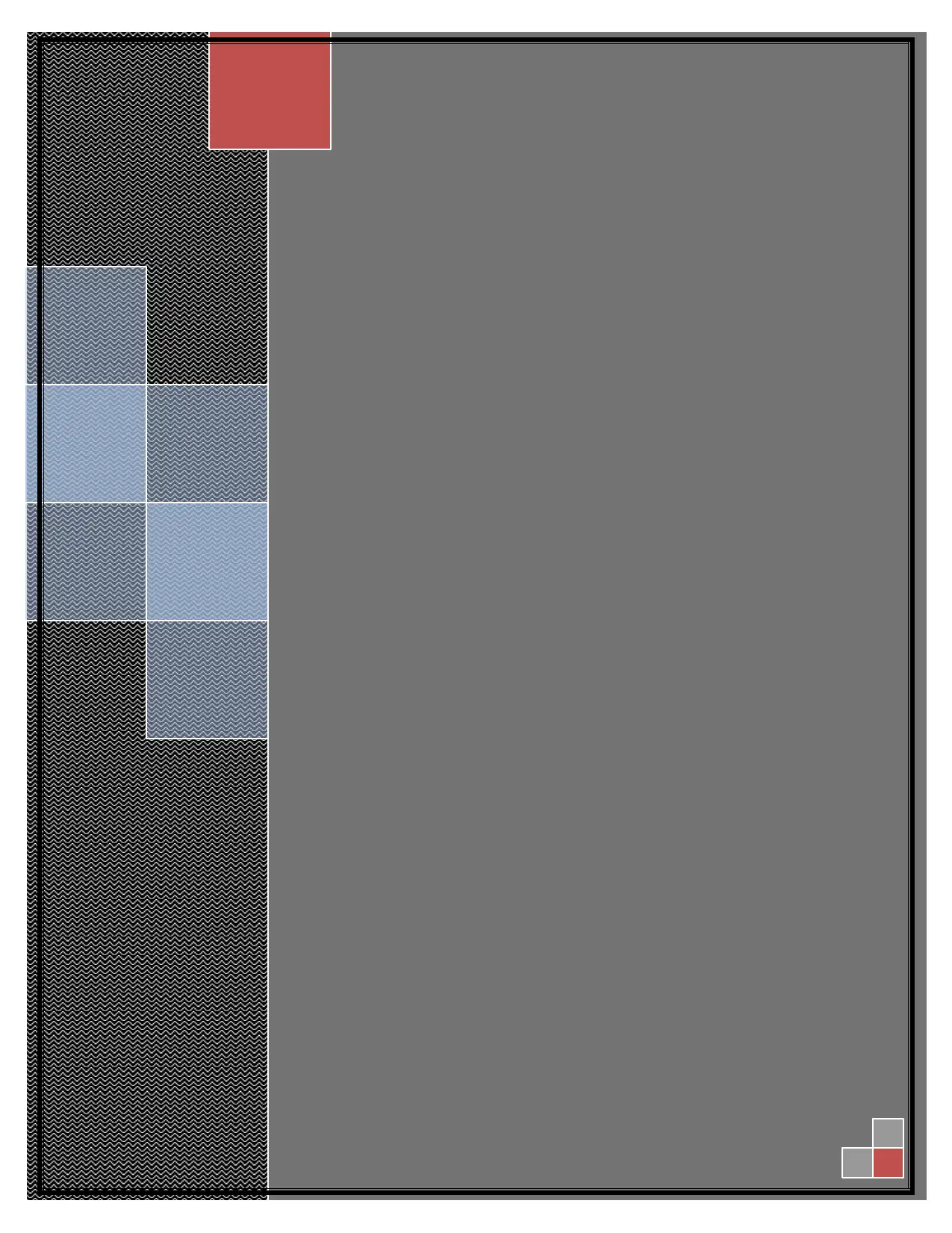
Secure Best Marks with AI Grader
Need help grading? Try our AI Grader for instant feedback on your assignments.
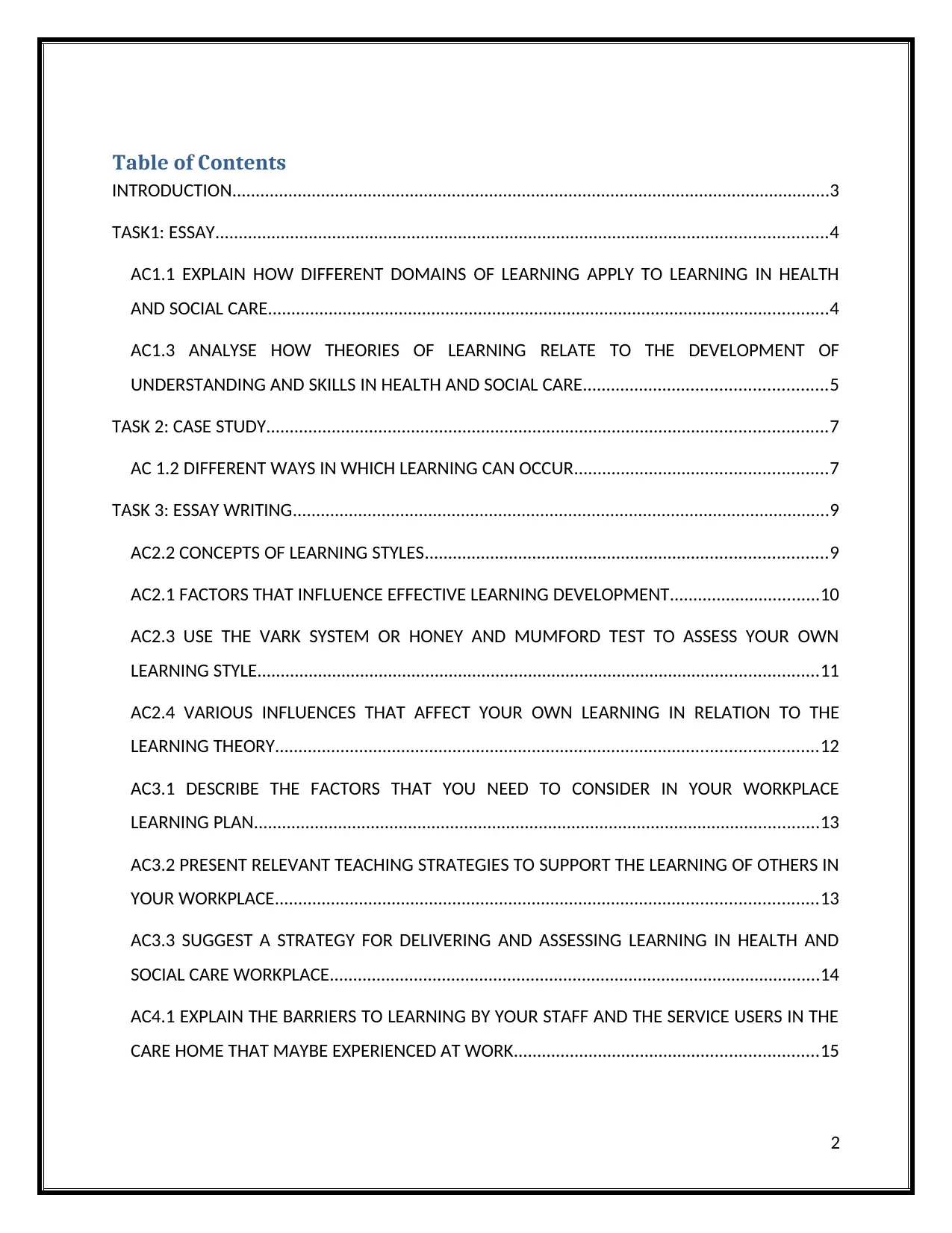
Table of Contents
INTRODUCTION................................................................................................................................3
TASK1: ESSAY...................................................................................................................................4
AC1.1 EXPLAIN HOW DIFFERENT DOMAINS OF LEARNING APPLY TO LEARNING IN HEALTH
AND SOCIAL CARE........................................................................................................................4
AC1.3 ANALYSE HOW THEORIES OF LEARNING RELATE TO THE DEVELOPMENT OF
UNDERSTANDING AND SKILLS IN HEALTH AND SOCIAL CARE....................................................5
TASK 2: CASE STUDY........................................................................................................................7
AC 1.2 DIFFERENT WAYS IN WHICH LEARNING CAN OCCUR......................................................7
TASK 3: ESSAY WRITING...................................................................................................................9
AC2.2 CONCEPTS OF LEARNING STYLES......................................................................................9
AC2.1 FACTORS THAT INFLUENCE EFFECTIVE LEARNING DEVELOPMENT................................10
AC2.3 USE THE VARK SYSTEM OR HONEY AND MUMFORD TEST TO ASSESS YOUR OWN
LEARNING STYLE........................................................................................................................11
AC2.4 VARIOUS INFLUENCES THAT AFFECT YOUR OWN LEARNING IN RELATION TO THE
LEARNING THEORY....................................................................................................................12
AC3.1 DESCRIBE THE FACTORS THAT YOU NEED TO CONSIDER IN YOUR WORKPLACE
LEARNING PLAN.........................................................................................................................13
AC3.2 PRESENT RELEVANT TEACHING STRATEGIES TO SUPPORT THE LEARNING OF OTHERS IN
YOUR WORKPLACE....................................................................................................................13
AC3.3 SUGGEST A STRATEGY FOR DELIVERING AND ASSESSING LEARNING IN HEALTH AND
SOCIAL CARE WORKPLACE.........................................................................................................14
AC4.1 EXPLAIN THE BARRIERS TO LEARNING BY YOUR STAFF AND THE SERVICE USERS IN THE
CARE HOME THAT MAYBE EXPERIENCED AT WORK.................................................................15
2
INTRODUCTION................................................................................................................................3
TASK1: ESSAY...................................................................................................................................4
AC1.1 EXPLAIN HOW DIFFERENT DOMAINS OF LEARNING APPLY TO LEARNING IN HEALTH
AND SOCIAL CARE........................................................................................................................4
AC1.3 ANALYSE HOW THEORIES OF LEARNING RELATE TO THE DEVELOPMENT OF
UNDERSTANDING AND SKILLS IN HEALTH AND SOCIAL CARE....................................................5
TASK 2: CASE STUDY........................................................................................................................7
AC 1.2 DIFFERENT WAYS IN WHICH LEARNING CAN OCCUR......................................................7
TASK 3: ESSAY WRITING...................................................................................................................9
AC2.2 CONCEPTS OF LEARNING STYLES......................................................................................9
AC2.1 FACTORS THAT INFLUENCE EFFECTIVE LEARNING DEVELOPMENT................................10
AC2.3 USE THE VARK SYSTEM OR HONEY AND MUMFORD TEST TO ASSESS YOUR OWN
LEARNING STYLE........................................................................................................................11
AC2.4 VARIOUS INFLUENCES THAT AFFECT YOUR OWN LEARNING IN RELATION TO THE
LEARNING THEORY....................................................................................................................12
AC3.1 DESCRIBE THE FACTORS THAT YOU NEED TO CONSIDER IN YOUR WORKPLACE
LEARNING PLAN.........................................................................................................................13
AC3.2 PRESENT RELEVANT TEACHING STRATEGIES TO SUPPORT THE LEARNING OF OTHERS IN
YOUR WORKPLACE....................................................................................................................13
AC3.3 SUGGEST A STRATEGY FOR DELIVERING AND ASSESSING LEARNING IN HEALTH AND
SOCIAL CARE WORKPLACE.........................................................................................................14
AC4.1 EXPLAIN THE BARRIERS TO LEARNING BY YOUR STAFF AND THE SERVICE USERS IN THE
CARE HOME THAT MAYBE EXPERIENCED AT WORK.................................................................15
2
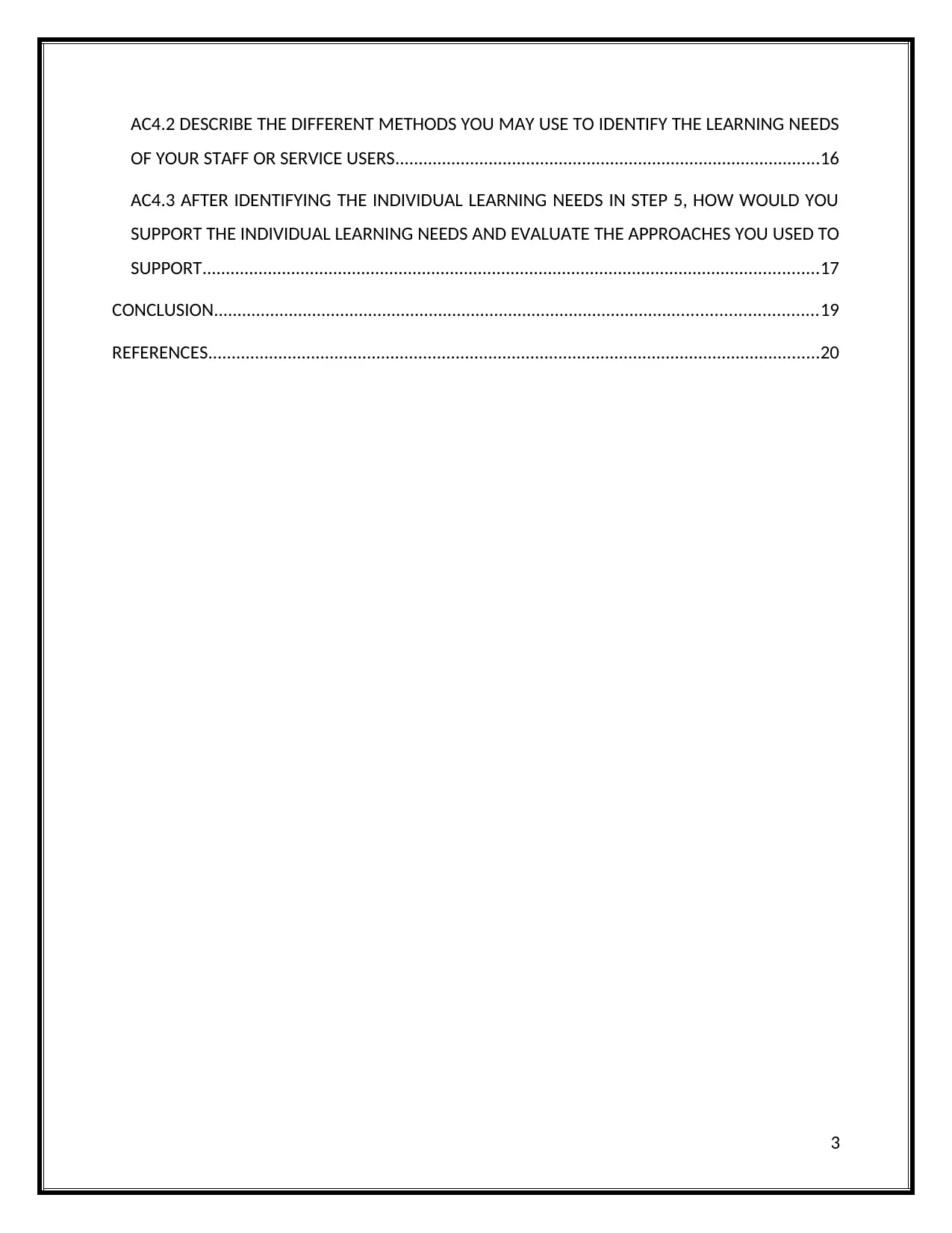
AC4.2 DESCRIBE THE DIFFERENT METHODS YOU MAY USE TO IDENTIFY THE LEARNING NEEDS
OF YOUR STAFF OR SERVICE USERS...........................................................................................16
AC4.3 AFTER IDENTIFYING THE INDIVIDUAL LEARNING NEEDS IN STEP 5, HOW WOULD YOU
SUPPORT THE INDIVIDUAL LEARNING NEEDS AND EVALUATE THE APPROACHES YOU USED TO
SUPPORT....................................................................................................................................17
CONCLUSION.................................................................................................................................19
REFERENCES...................................................................................................................................20
3
OF YOUR STAFF OR SERVICE USERS...........................................................................................16
AC4.3 AFTER IDENTIFYING THE INDIVIDUAL LEARNING NEEDS IN STEP 5, HOW WOULD YOU
SUPPORT THE INDIVIDUAL LEARNING NEEDS AND EVALUATE THE APPROACHES YOU USED TO
SUPPORT....................................................................................................................................17
CONCLUSION.................................................................................................................................19
REFERENCES...................................................................................................................................20
3
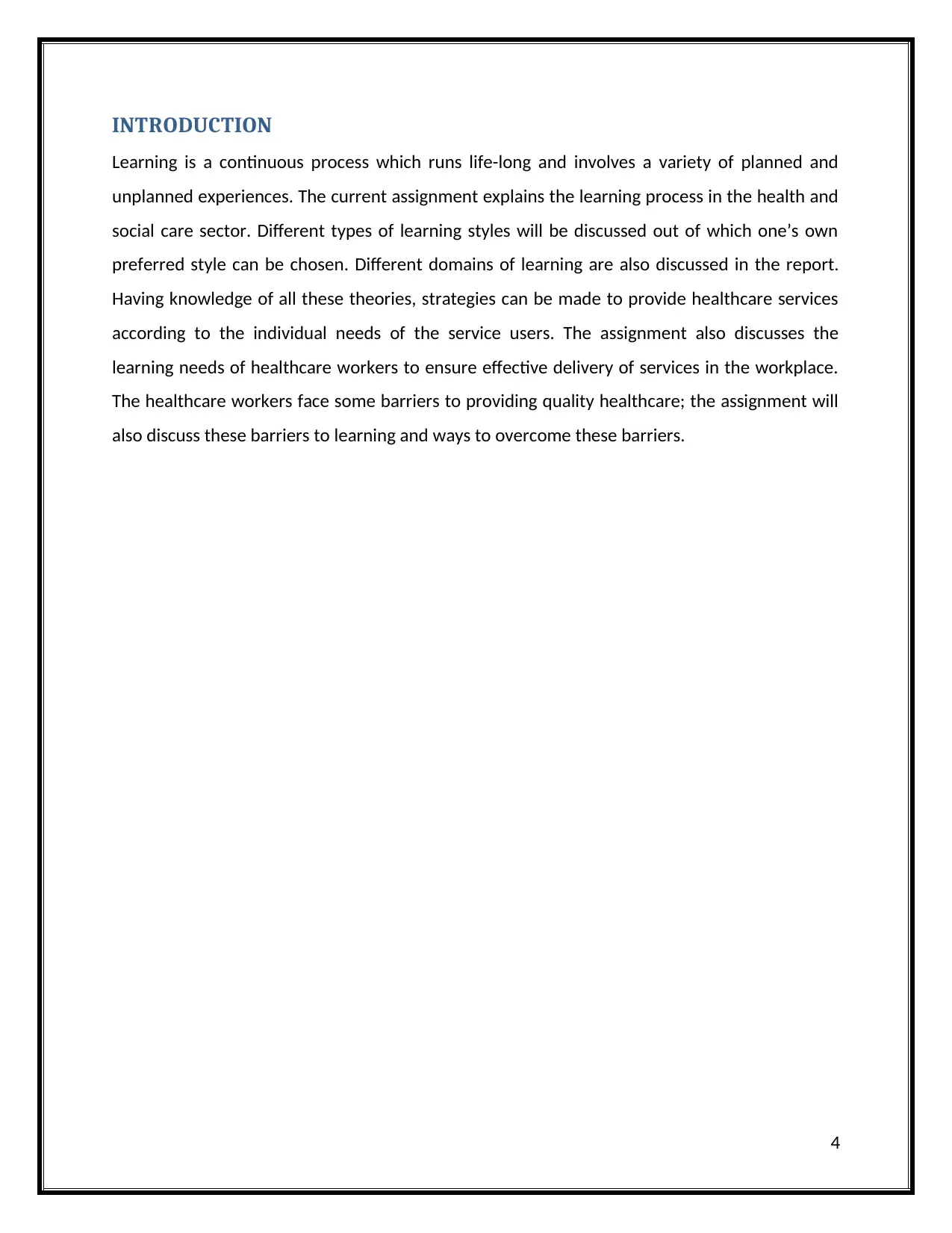
INTRODUCTION
Learning is a continuous process which runs life-long and involves a variety of planned and
unplanned experiences. The current assignment explains the learning process in the health and
social care sector. Different types of learning styles will be discussed out of which one’s own
preferred style can be chosen. Different domains of learning are also discussed in the report.
Having knowledge of all these theories, strategies can be made to provide healthcare services
according to the individual needs of the service users. The assignment also discusses the
learning needs of healthcare workers to ensure effective delivery of services in the workplace.
The healthcare workers face some barriers to providing quality healthcare; the assignment will
also discuss these barriers to learning and ways to overcome these barriers.
4
Learning is a continuous process which runs life-long and involves a variety of planned and
unplanned experiences. The current assignment explains the learning process in the health and
social care sector. Different types of learning styles will be discussed out of which one’s own
preferred style can be chosen. Different domains of learning are also discussed in the report.
Having knowledge of all these theories, strategies can be made to provide healthcare services
according to the individual needs of the service users. The assignment also discusses the
learning needs of healthcare workers to ensure effective delivery of services in the workplace.
The healthcare workers face some barriers to providing quality healthcare; the assignment will
also discuss these barriers to learning and ways to overcome these barriers.
4
Secure Best Marks with AI Grader
Need help grading? Try our AI Grader for instant feedback on your assignments.
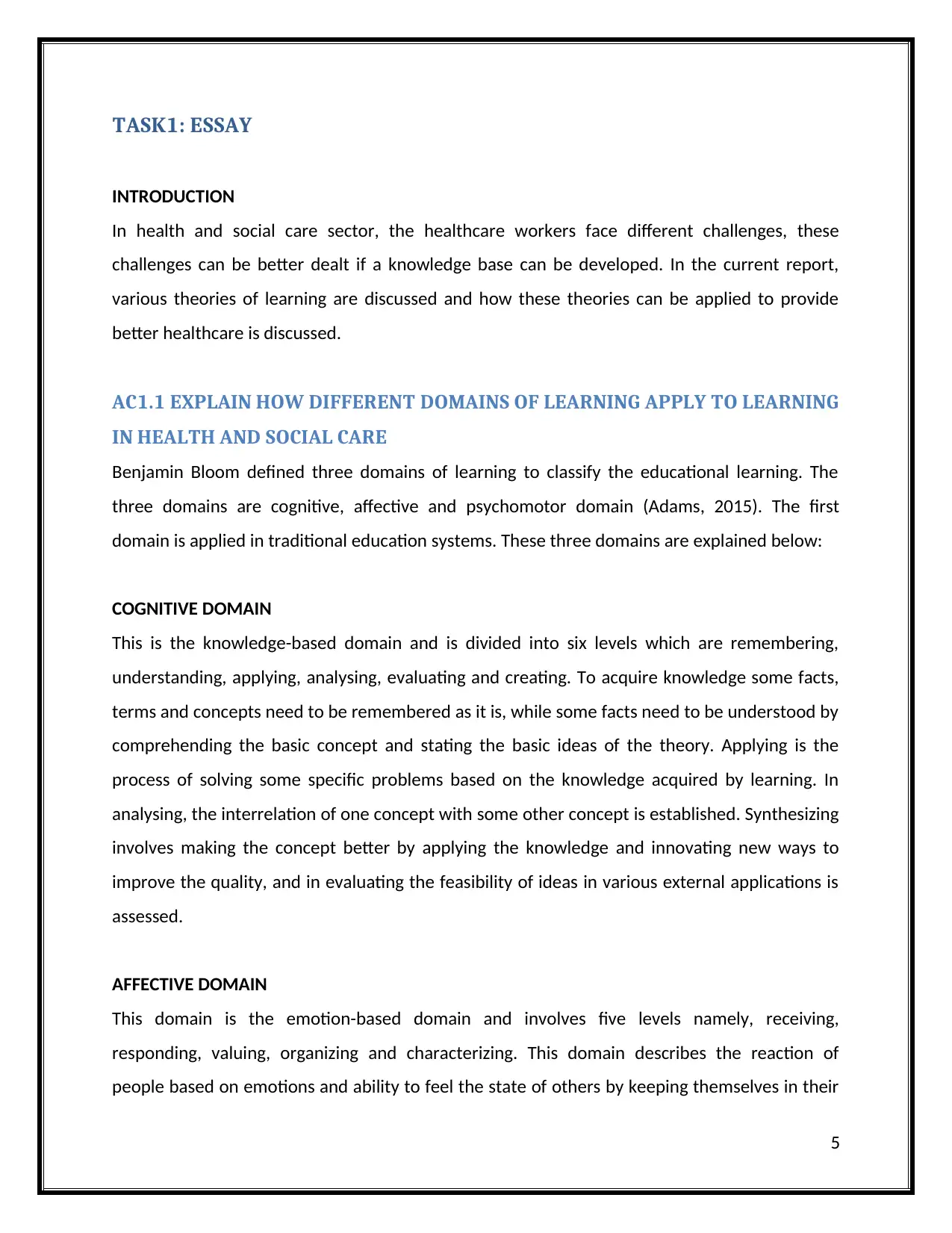
TASK1: ESSAY
INTRODUCTION
In health and social care sector, the healthcare workers face different challenges, these
challenges can be better dealt if a knowledge base can be developed. In the current report,
various theories of learning are discussed and how these theories can be applied to provide
better healthcare is discussed.
AC1.1 EXPLAIN HOW DIFFERENT DOMAINS OF LEARNING APPLY TO LEARNING
IN HEALTH AND SOCIAL CARE
Benjamin Bloom defined three domains of learning to classify the educational learning. The
three domains are cognitive, affective and psychomotor domain (Adams, 2015). The first
domain is applied in traditional education systems. These three domains are explained below:
COGNITIVE DOMAIN
This is the knowledge-based domain and is divided into six levels which are remembering,
understanding, applying, analysing, evaluating and creating. To acquire knowledge some facts,
terms and concepts need to be remembered as it is, while some facts need to be understood by
comprehending the basic concept and stating the basic ideas of the theory. Applying is the
process of solving some specific problems based on the knowledge acquired by learning. In
analysing, the interrelation of one concept with some other concept is established. Synthesizing
involves making the concept better by applying the knowledge and innovating new ways to
improve the quality, and in evaluating the feasibility of ideas in various external applications is
assessed.
AFFECTIVE DOMAIN
This domain is the emotion-based domain and involves five levels namely, receiving,
responding, valuing, organizing and characterizing. This domain describes the reaction of
people based on emotions and ability to feel the state of others by keeping themselves in their
5
INTRODUCTION
In health and social care sector, the healthcare workers face different challenges, these
challenges can be better dealt if a knowledge base can be developed. In the current report,
various theories of learning are discussed and how these theories can be applied to provide
better healthcare is discussed.
AC1.1 EXPLAIN HOW DIFFERENT DOMAINS OF LEARNING APPLY TO LEARNING
IN HEALTH AND SOCIAL CARE
Benjamin Bloom defined three domains of learning to classify the educational learning. The
three domains are cognitive, affective and psychomotor domain (Adams, 2015). The first
domain is applied in traditional education systems. These three domains are explained below:
COGNITIVE DOMAIN
This is the knowledge-based domain and is divided into six levels which are remembering,
understanding, applying, analysing, evaluating and creating. To acquire knowledge some facts,
terms and concepts need to be remembered as it is, while some facts need to be understood by
comprehending the basic concept and stating the basic ideas of the theory. Applying is the
process of solving some specific problems based on the knowledge acquired by learning. In
analysing, the interrelation of one concept with some other concept is established. Synthesizing
involves making the concept better by applying the knowledge and innovating new ways to
improve the quality, and in evaluating the feasibility of ideas in various external applications is
assessed.
AFFECTIVE DOMAIN
This domain is the emotion-based domain and involves five levels namely, receiving,
responding, valuing, organizing and characterizing. This domain describes the reaction of
people based on emotions and ability to feel the state of others by keeping themselves in their
5
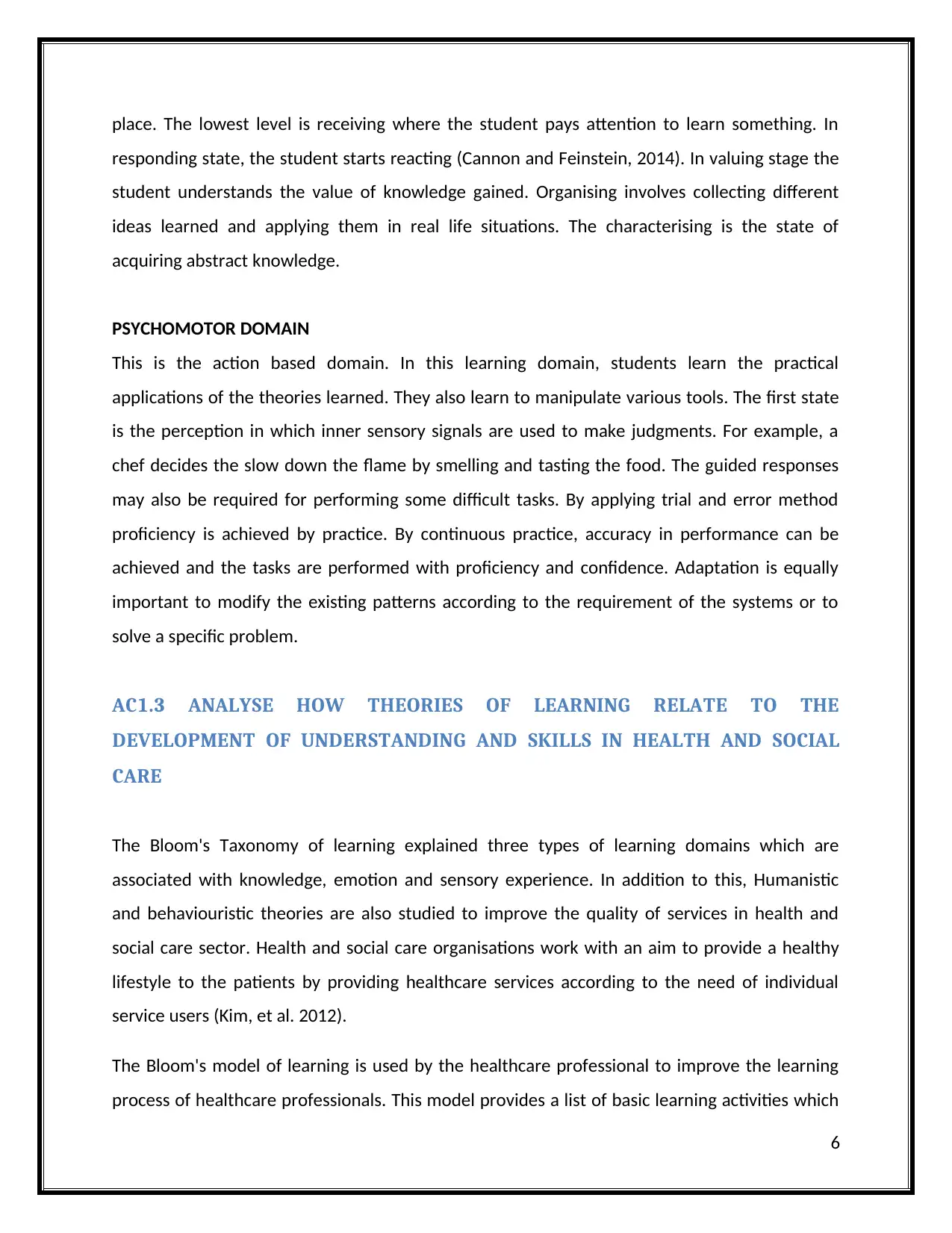
place. The lowest level is receiving where the student pays attention to learn something. In
responding state, the student starts reacting (Cannon and Feinstein, 2014). In valuing stage the
student understands the value of knowledge gained. Organising involves collecting different
ideas learned and applying them in real life situations. The characterising is the state of
acquiring abstract knowledge.
PSYCHOMOTOR DOMAIN
This is the action based domain. In this learning domain, students learn the practical
applications of the theories learned. They also learn to manipulate various tools. The first state
is the perception in which inner sensory signals are used to make judgments. For example, a
chef decides the slow down the flame by smelling and tasting the food. The guided responses
may also be required for performing some difficult tasks. By applying trial and error method
proficiency is achieved by practice. By continuous practice, accuracy in performance can be
achieved and the tasks are performed with proficiency and confidence. Adaptation is equally
important to modify the existing patterns according to the requirement of the systems or to
solve a specific problem.
AC1.3 ANALYSE HOW THEORIES OF LEARNING RELATE TO THE
DEVELOPMENT OF UNDERSTANDING AND SKILLS IN HEALTH AND SOCIAL
CARE
The Bloom's Taxonomy of learning explained three types of learning domains which are
associated with knowledge, emotion and sensory experience. In addition to this, Humanistic
and behaviouristic theories are also studied to improve the quality of services in health and
social care sector. Health and social care organisations work with an aim to provide a healthy
lifestyle to the patients by providing healthcare services according to the need of individual
service users (Kim, et al. 2012).
The Bloom's model of learning is used by the healthcare professional to improve the learning
process of healthcare professionals. This model provides a list of basic learning activities which
6
responding state, the student starts reacting (Cannon and Feinstein, 2014). In valuing stage the
student understands the value of knowledge gained. Organising involves collecting different
ideas learned and applying them in real life situations. The characterising is the state of
acquiring abstract knowledge.
PSYCHOMOTOR DOMAIN
This is the action based domain. In this learning domain, students learn the practical
applications of the theories learned. They also learn to manipulate various tools. The first state
is the perception in which inner sensory signals are used to make judgments. For example, a
chef decides the slow down the flame by smelling and tasting the food. The guided responses
may also be required for performing some difficult tasks. By applying trial and error method
proficiency is achieved by practice. By continuous practice, accuracy in performance can be
achieved and the tasks are performed with proficiency and confidence. Adaptation is equally
important to modify the existing patterns according to the requirement of the systems or to
solve a specific problem.
AC1.3 ANALYSE HOW THEORIES OF LEARNING RELATE TO THE
DEVELOPMENT OF UNDERSTANDING AND SKILLS IN HEALTH AND SOCIAL
CARE
The Bloom's Taxonomy of learning explained three types of learning domains which are
associated with knowledge, emotion and sensory experience. In addition to this, Humanistic
and behaviouristic theories are also studied to improve the quality of services in health and
social care sector. Health and social care organisations work with an aim to provide a healthy
lifestyle to the patients by providing healthcare services according to the need of individual
service users (Kim, et al. 2012).
The Bloom's model of learning is used by the healthcare professional to improve the learning
process of healthcare professionals. This model provides a list of basic learning activities which
6
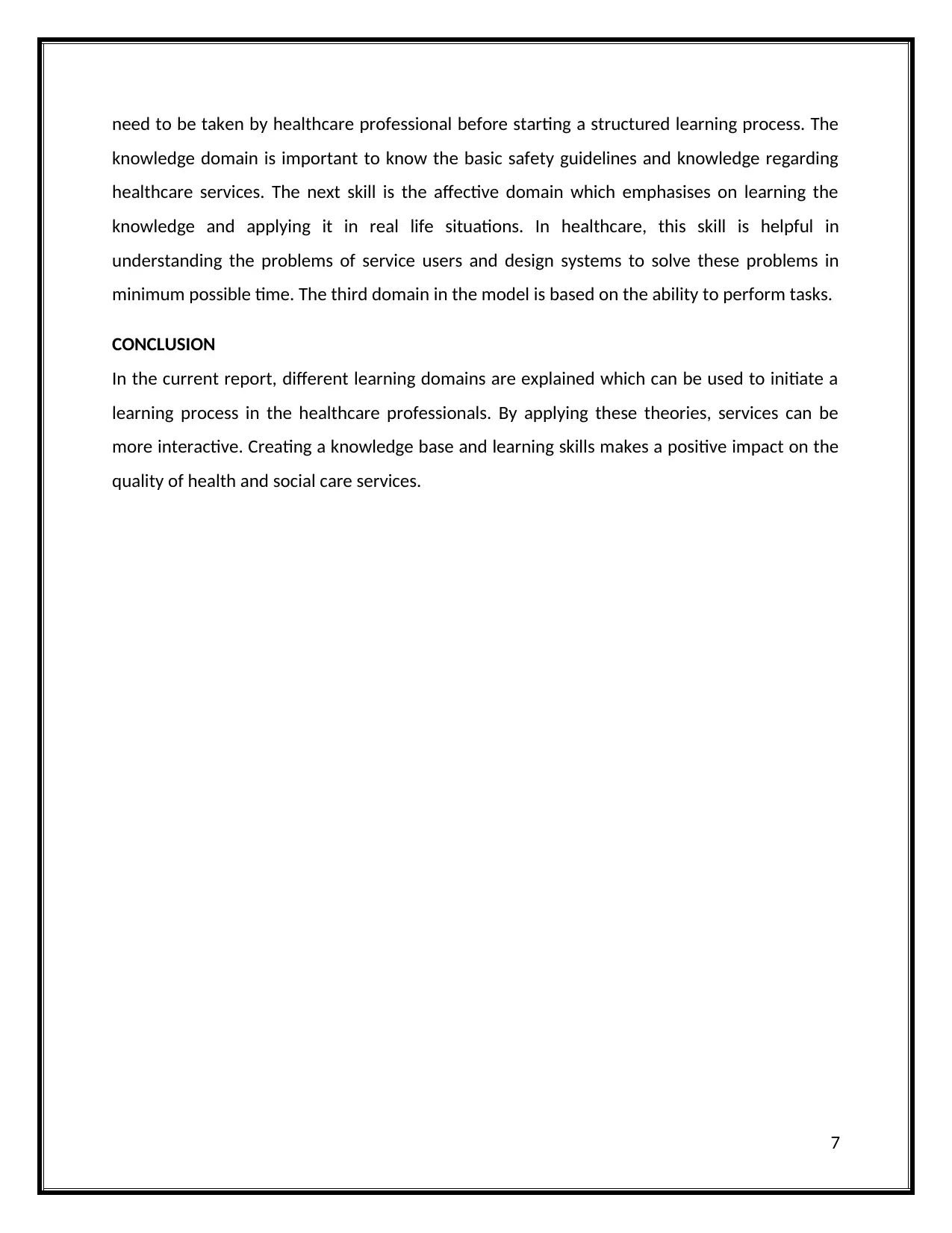
need to be taken by healthcare professional before starting a structured learning process. The
knowledge domain is important to know the basic safety guidelines and knowledge regarding
healthcare services. The next skill is the affective domain which emphasises on learning the
knowledge and applying it in real life situations. In healthcare, this skill is helpful in
understanding the problems of service users and design systems to solve these problems in
minimum possible time. The third domain in the model is based on the ability to perform tasks.
CONCLUSION
In the current report, different learning domains are explained which can be used to initiate a
learning process in the healthcare professionals. By applying these theories, services can be
more interactive. Creating a knowledge base and learning skills makes a positive impact on the
quality of health and social care services.
7
knowledge domain is important to know the basic safety guidelines and knowledge regarding
healthcare services. The next skill is the affective domain which emphasises on learning the
knowledge and applying it in real life situations. In healthcare, this skill is helpful in
understanding the problems of service users and design systems to solve these problems in
minimum possible time. The third domain in the model is based on the ability to perform tasks.
CONCLUSION
In the current report, different learning domains are explained which can be used to initiate a
learning process in the healthcare professionals. By applying these theories, services can be
more interactive. Creating a knowledge base and learning skills makes a positive impact on the
quality of health and social care services.
7
Paraphrase This Document
Need a fresh take? Get an instant paraphrase of this document with our AI Paraphraser
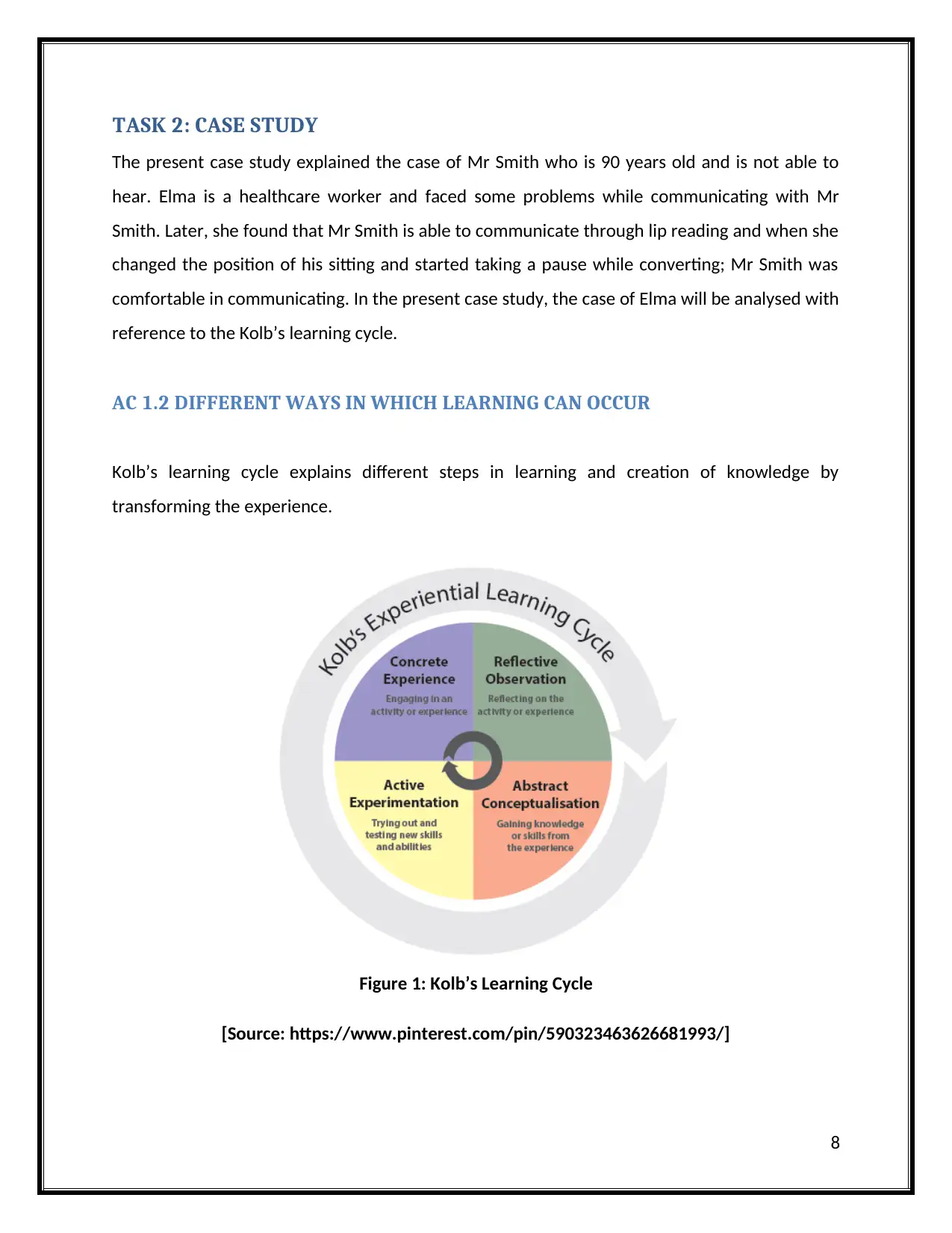
TASK 2: CASE STUDY
The present case study explained the case of Mr Smith who is 90 years old and is not able to
hear. Elma is a healthcare worker and faced some problems while communicating with Mr
Smith. Later, she found that Mr Smith is able to communicate through lip reading and when she
changed the position of his sitting and started taking a pause while converting; Mr Smith was
comfortable in communicating. In the present case study, the case of Elma will be analysed with
reference to the Kolb’s learning cycle.
AC 1.2 DIFFERENT WAYS IN WHICH LEARNING CAN OCCUR
Kolb’s learning cycle explains different steps in learning and creation of knowledge by
transforming the experience.
Figure 1: Kolb’s Learning Cycle
[Source: https://www.pinterest.com/pin/590323463626681993/]
8
The present case study explained the case of Mr Smith who is 90 years old and is not able to
hear. Elma is a healthcare worker and faced some problems while communicating with Mr
Smith. Later, she found that Mr Smith is able to communicate through lip reading and when she
changed the position of his sitting and started taking a pause while converting; Mr Smith was
comfortable in communicating. In the present case study, the case of Elma will be analysed with
reference to the Kolb’s learning cycle.
AC 1.2 DIFFERENT WAYS IN WHICH LEARNING CAN OCCUR
Kolb’s learning cycle explains different steps in learning and creation of knowledge by
transforming the experience.
Figure 1: Kolb’s Learning Cycle
[Source: https://www.pinterest.com/pin/590323463626681993/]
8
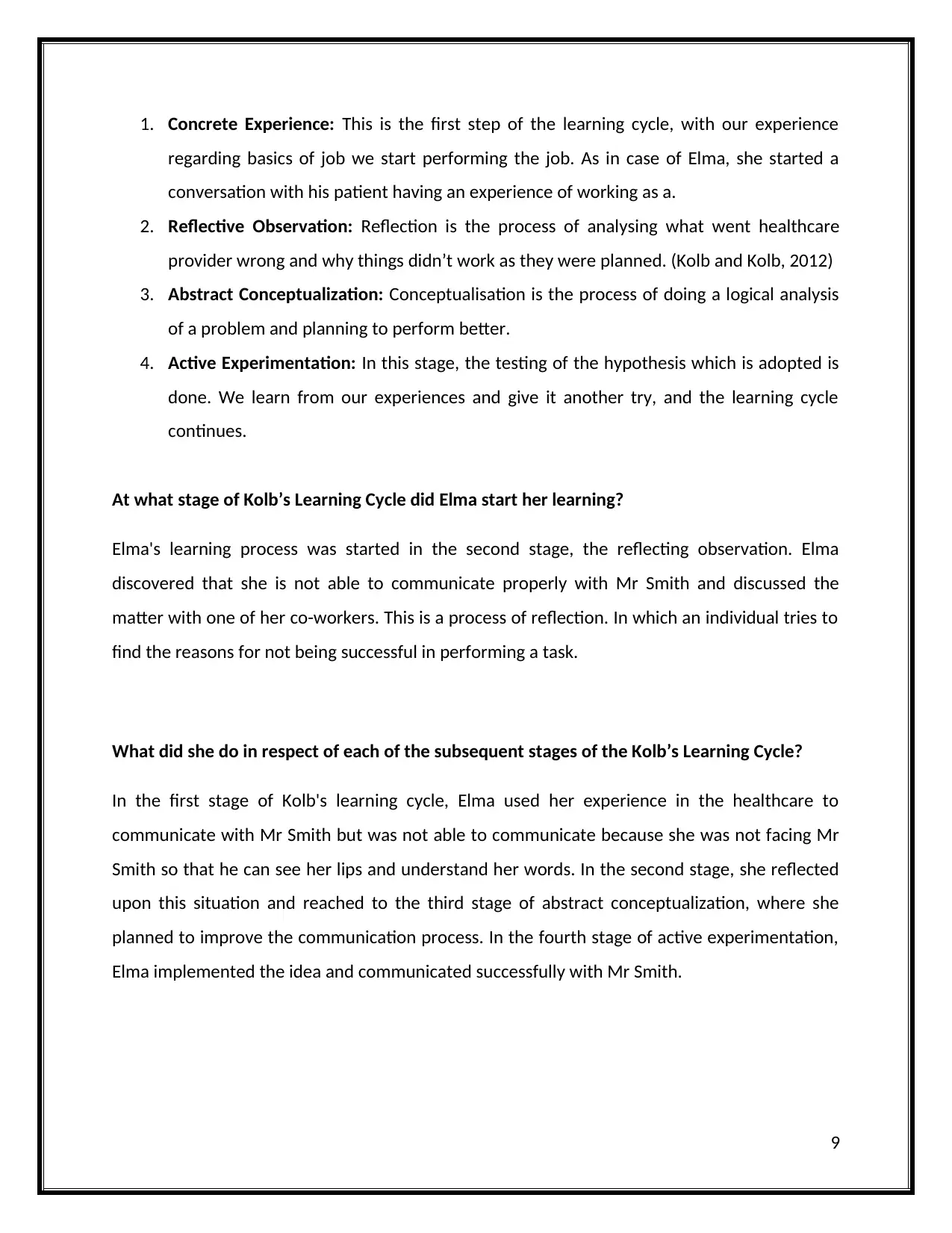
1. Concrete Experience: This is the first step of the learning cycle, with our experience
regarding basics of job we start performing the job. As in case of Elma, she started a
conversation with his patient having an experience of working as a.
2. Reflective Observation: Reflection is the process of analysing what went healthcare
provider wrong and why things didn’t work as they were planned. (Kolb and Kolb, 2012)
3. Abstract Conceptualization: Conceptualisation is the process of doing a logical analysis
of a problem and planning to perform better.
4. Active Experimentation: In this stage, the testing of the hypothesis which is adopted is
done. We learn from our experiences and give it another try, and the learning cycle
continues.
At what stage of Kolb’s Learning Cycle did Elma start her learning?
Elma's learning process was started in the second stage, the reflecting observation. Elma
discovered that she is not able to communicate properly with Mr Smith and discussed the
matter with one of her co-workers. This is a process of reflection. In which an individual tries to
find the reasons for not being successful in performing a task.
What did she do in respect of each of the subsequent stages of the Kolb’s Learning Cycle?
In the first stage of Kolb's learning cycle, Elma used her experience in the healthcare to
communicate with Mr Smith but was not able to communicate because she was not facing Mr
Smith so that he can see her lips and understand her words. In the second stage, she reflected
upon this situation and reached to the third stage of abstract conceptualization, where she
planned to improve the communication process. In the fourth stage of active experimentation,
Elma implemented the idea and communicated successfully with Mr Smith.
9
regarding basics of job we start performing the job. As in case of Elma, she started a
conversation with his patient having an experience of working as a.
2. Reflective Observation: Reflection is the process of analysing what went healthcare
provider wrong and why things didn’t work as they were planned. (Kolb and Kolb, 2012)
3. Abstract Conceptualization: Conceptualisation is the process of doing a logical analysis
of a problem and planning to perform better.
4. Active Experimentation: In this stage, the testing of the hypothesis which is adopted is
done. We learn from our experiences and give it another try, and the learning cycle
continues.
At what stage of Kolb’s Learning Cycle did Elma start her learning?
Elma's learning process was started in the second stage, the reflecting observation. Elma
discovered that she is not able to communicate properly with Mr Smith and discussed the
matter with one of her co-workers. This is a process of reflection. In which an individual tries to
find the reasons for not being successful in performing a task.
What did she do in respect of each of the subsequent stages of the Kolb’s Learning Cycle?
In the first stage of Kolb's learning cycle, Elma used her experience in the healthcare to
communicate with Mr Smith but was not able to communicate because she was not facing Mr
Smith so that he can see her lips and understand her words. In the second stage, she reflected
upon this situation and reached to the third stage of abstract conceptualization, where she
planned to improve the communication process. In the fourth stage of active experimentation,
Elma implemented the idea and communicated successfully with Mr Smith.
9
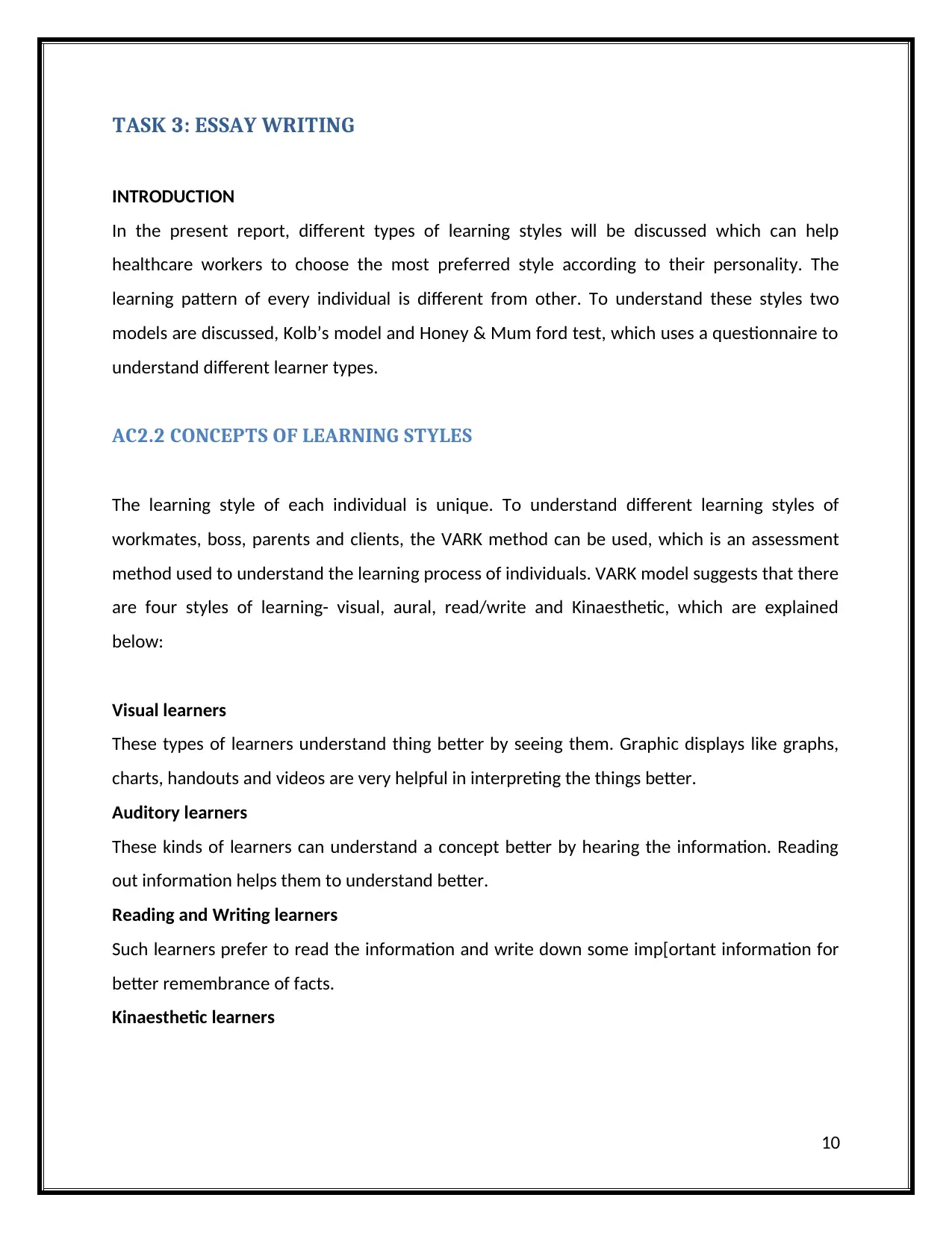
TASK 3: ESSAY WRITING
INTRODUCTION
In the present report, different types of learning styles will be discussed which can help
healthcare workers to choose the most preferred style according to their personality. The
learning pattern of every individual is different from other. To understand these styles two
models are discussed, Kolb’s model and Honey & Mum ford test, which uses a questionnaire to
understand different learner types.
AC2.2 CONCEPTS OF LEARNING STYLES
The learning style of each individual is unique. To understand different learning styles of
workmates, boss, parents and clients, the VARK method can be used, which is an assessment
method used to understand the learning process of individuals. VARK model suggests that there
are four styles of learning- visual, aural, read/write and Kinaesthetic, which are explained
below:
Visual learners
These types of learners understand thing better by seeing them. Graphic displays like graphs,
charts, handouts and videos are very helpful in interpreting the things better.
Auditory learners
These kinds of learners can understand a concept better by hearing the information. Reading
out information helps them to understand better.
Reading and Writing learners
Such learners prefer to read the information and write down some imp[ortant information for
better remembrance of facts.
Kinaesthetic learners
10
INTRODUCTION
In the present report, different types of learning styles will be discussed which can help
healthcare workers to choose the most preferred style according to their personality. The
learning pattern of every individual is different from other. To understand these styles two
models are discussed, Kolb’s model and Honey & Mum ford test, which uses a questionnaire to
understand different learner types.
AC2.2 CONCEPTS OF LEARNING STYLES
The learning style of each individual is unique. To understand different learning styles of
workmates, boss, parents and clients, the VARK method can be used, which is an assessment
method used to understand the learning process of individuals. VARK model suggests that there
are four styles of learning- visual, aural, read/write and Kinaesthetic, which are explained
below:
Visual learners
These types of learners understand thing better by seeing them. Graphic displays like graphs,
charts, handouts and videos are very helpful in interpreting the things better.
Auditory learners
These kinds of learners can understand a concept better by hearing the information. Reading
out information helps them to understand better.
Reading and Writing learners
Such learners prefer to read the information and write down some imp[ortant information for
better remembrance of facts.
Kinaesthetic learners
10
Secure Best Marks with AI Grader
Need help grading? Try our AI Grader for instant feedback on your assignments.
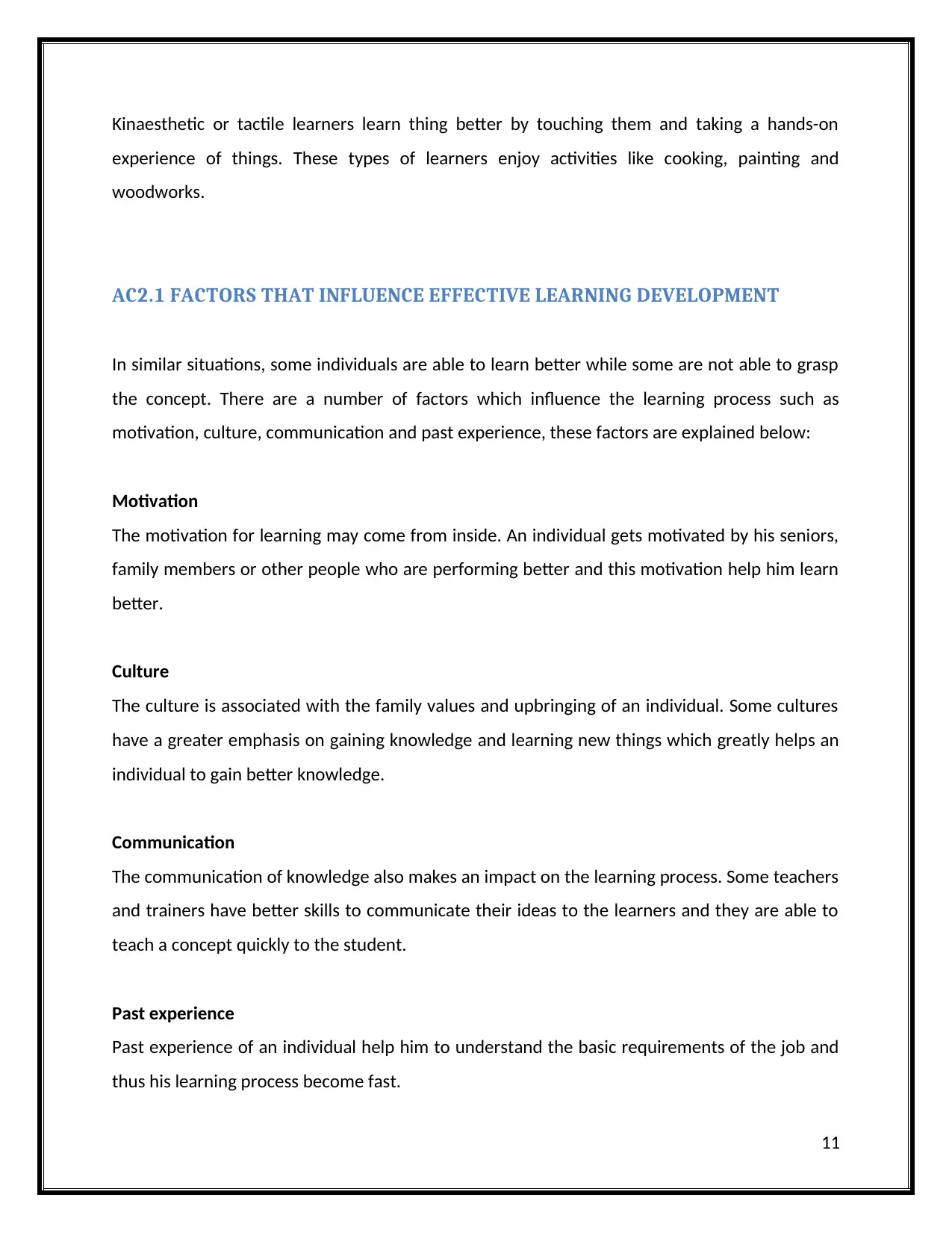
Kinaesthetic or tactile learners learn thing better by touching them and taking a hands-on
experience of things. These types of learners enjoy activities like cooking, painting and
woodworks.
AC2.1 FACTORS THAT INFLUENCE EFFECTIVE LEARNING DEVELOPMENT
In similar situations, some individuals are able to learn better while some are not able to grasp
the concept. There are a number of factors which influence the learning process such as
motivation, culture, communication and past experience, these factors are explained below:
Motivation
The motivation for learning may come from inside. An individual gets motivated by his seniors,
family members or other people who are performing better and this motivation help him learn
better.
Culture
The culture is associated with the family values and upbringing of an individual. Some cultures
have a greater emphasis on gaining knowledge and learning new things which greatly helps an
individual to gain better knowledge.
Communication
The communication of knowledge also makes an impact on the learning process. Some teachers
and trainers have better skills to communicate their ideas to the learners and they are able to
teach a concept quickly to the student.
Past experience
Past experience of an individual help him to understand the basic requirements of the job and
thus his learning process become fast.
11
experience of things. These types of learners enjoy activities like cooking, painting and
woodworks.
AC2.1 FACTORS THAT INFLUENCE EFFECTIVE LEARNING DEVELOPMENT
In similar situations, some individuals are able to learn better while some are not able to grasp
the concept. There are a number of factors which influence the learning process such as
motivation, culture, communication and past experience, these factors are explained below:
Motivation
The motivation for learning may come from inside. An individual gets motivated by his seniors,
family members or other people who are performing better and this motivation help him learn
better.
Culture
The culture is associated with the family values and upbringing of an individual. Some cultures
have a greater emphasis on gaining knowledge and learning new things which greatly helps an
individual to gain better knowledge.
Communication
The communication of knowledge also makes an impact on the learning process. Some teachers
and trainers have better skills to communicate their ideas to the learners and they are able to
teach a concept quickly to the student.
Past experience
Past experience of an individual help him to understand the basic requirements of the job and
thus his learning process become fast.
11
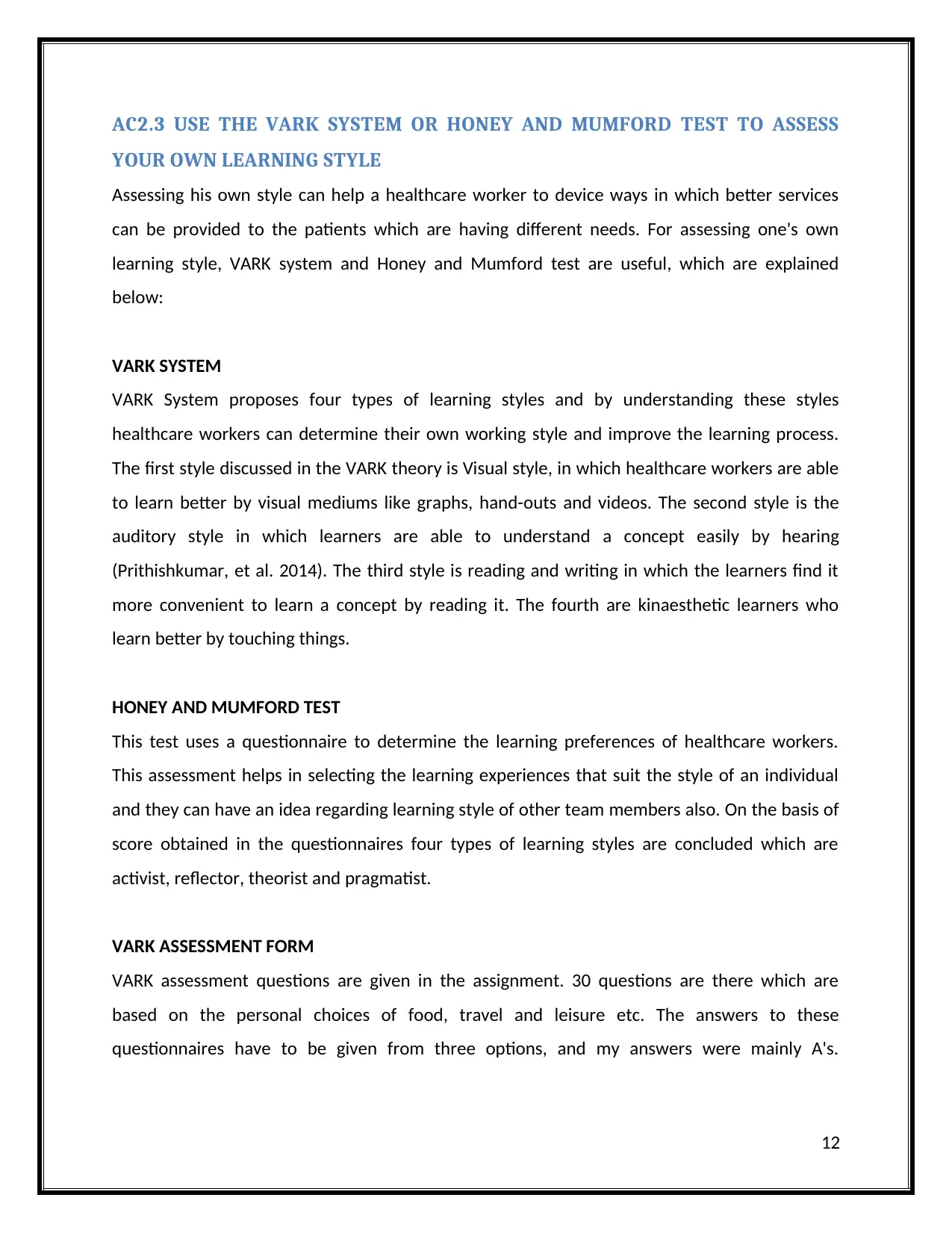
AC2.3 USE THE VARK SYSTEM OR HONEY AND MUMFORD TEST TO ASSESS
YOUR OWN LEARNING STYLE
Assessing his own style can help a healthcare worker to device ways in which better services
can be provided to the patients which are having different needs. For assessing one's own
learning style, VARK system and Honey and Mumford test are useful, which are explained
below:
VARK SYSTEM
VARK System proposes four types of learning styles and by understanding these styles
healthcare workers can determine their own working style and improve the learning process.
The first style discussed in the VARK theory is Visual style, in which healthcare workers are able
to learn better by visual mediums like graphs, hand-outs and videos. The second style is the
auditory style in which learners are able to understand a concept easily by hearing
(Prithishkumar, et al. 2014). The third style is reading and writing in which the learners find it
more convenient to learn a concept by reading it. The fourth are kinaesthetic learners who
learn better by touching things.
HONEY AND MUMFORD TEST
This test uses a questionnaire to determine the learning preferences of healthcare workers.
This assessment helps in selecting the learning experiences that suit the style of an individual
and they can have an idea regarding learning style of other team members also. On the basis of
score obtained in the questionnaires four types of learning styles are concluded which are
activist, reflector, theorist and pragmatist.
VARK ASSESSMENT FORM
VARK assessment questions are given in the assignment. 30 questions are there which are
based on the personal choices of food, travel and leisure etc. The answers to these
questionnaires have to be given from three options, and my answers were mainly A's.
12
YOUR OWN LEARNING STYLE
Assessing his own style can help a healthcare worker to device ways in which better services
can be provided to the patients which are having different needs. For assessing one's own
learning style, VARK system and Honey and Mumford test are useful, which are explained
below:
VARK SYSTEM
VARK System proposes four types of learning styles and by understanding these styles
healthcare workers can determine their own working style and improve the learning process.
The first style discussed in the VARK theory is Visual style, in which healthcare workers are able
to learn better by visual mediums like graphs, hand-outs and videos. The second style is the
auditory style in which learners are able to understand a concept easily by hearing
(Prithishkumar, et al. 2014). The third style is reading and writing in which the learners find it
more convenient to learn a concept by reading it. The fourth are kinaesthetic learners who
learn better by touching things.
HONEY AND MUMFORD TEST
This test uses a questionnaire to determine the learning preferences of healthcare workers.
This assessment helps in selecting the learning experiences that suit the style of an individual
and they can have an idea regarding learning style of other team members also. On the basis of
score obtained in the questionnaires four types of learning styles are concluded which are
activist, reflector, theorist and pragmatist.
VARK ASSESSMENT FORM
VARK assessment questions are given in the assignment. 30 questions are there which are
based on the personal choices of food, travel and leisure etc. The answers to these
questionnaires have to be given from three options, and my answers were mainly A's.
12
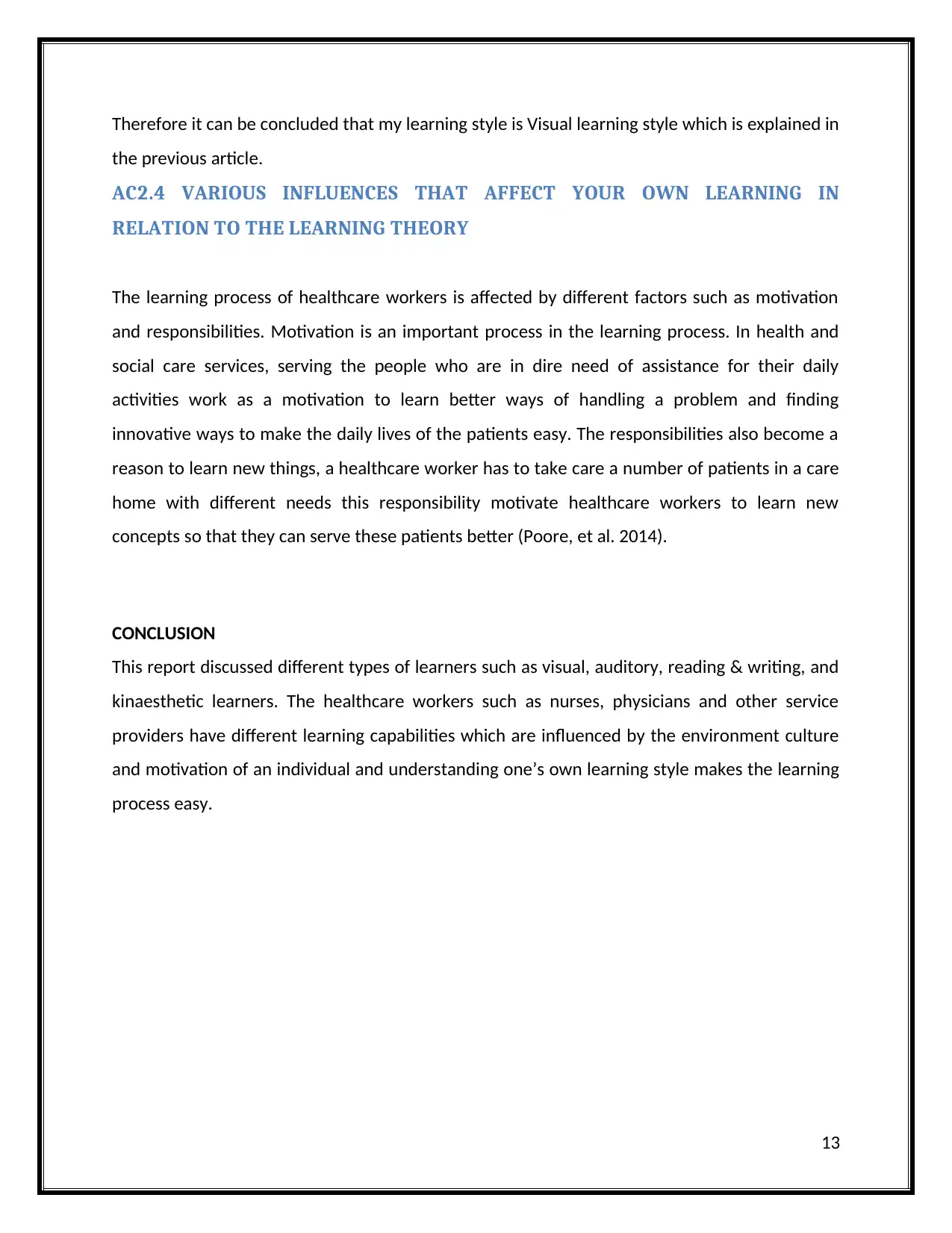
Therefore it can be concluded that my learning style is Visual learning style which is explained in
the previous article.
AC2.4 VARIOUS INFLUENCES THAT AFFECT YOUR OWN LEARNING IN
RELATION TO THE LEARNING THEORY
The learning process of healthcare workers is affected by different factors such as motivation
and responsibilities. Motivation is an important process in the learning process. In health and
social care services, serving the people who are in dire need of assistance for their daily
activities work as a motivation to learn better ways of handling a problem and finding
innovative ways to make the daily lives of the patients easy. The responsibilities also become a
reason to learn new things, a healthcare worker has to take care a number of patients in a care
home with different needs this responsibility motivate healthcare workers to learn new
concepts so that they can serve these patients better (Poore, et al. 2014).
CONCLUSION
This report discussed different types of learners such as visual, auditory, reading & writing, and
kinaesthetic learners. The healthcare workers such as nurses, physicians and other service
providers have different learning capabilities which are influenced by the environment culture
and motivation of an individual and understanding one’s own learning style makes the learning
process easy.
13
the previous article.
AC2.4 VARIOUS INFLUENCES THAT AFFECT YOUR OWN LEARNING IN
RELATION TO THE LEARNING THEORY
The learning process of healthcare workers is affected by different factors such as motivation
and responsibilities. Motivation is an important process in the learning process. In health and
social care services, serving the people who are in dire need of assistance for their daily
activities work as a motivation to learn better ways of handling a problem and finding
innovative ways to make the daily lives of the patients easy. The responsibilities also become a
reason to learn new things, a healthcare worker has to take care a number of patients in a care
home with different needs this responsibility motivate healthcare workers to learn new
concepts so that they can serve these patients better (Poore, et al. 2014).
CONCLUSION
This report discussed different types of learners such as visual, auditory, reading & writing, and
kinaesthetic learners. The healthcare workers such as nurses, physicians and other service
providers have different learning capabilities which are influenced by the environment culture
and motivation of an individual and understanding one’s own learning style makes the learning
process easy.
13
Paraphrase This Document
Need a fresh take? Get an instant paraphrase of this document with our AI Paraphraser
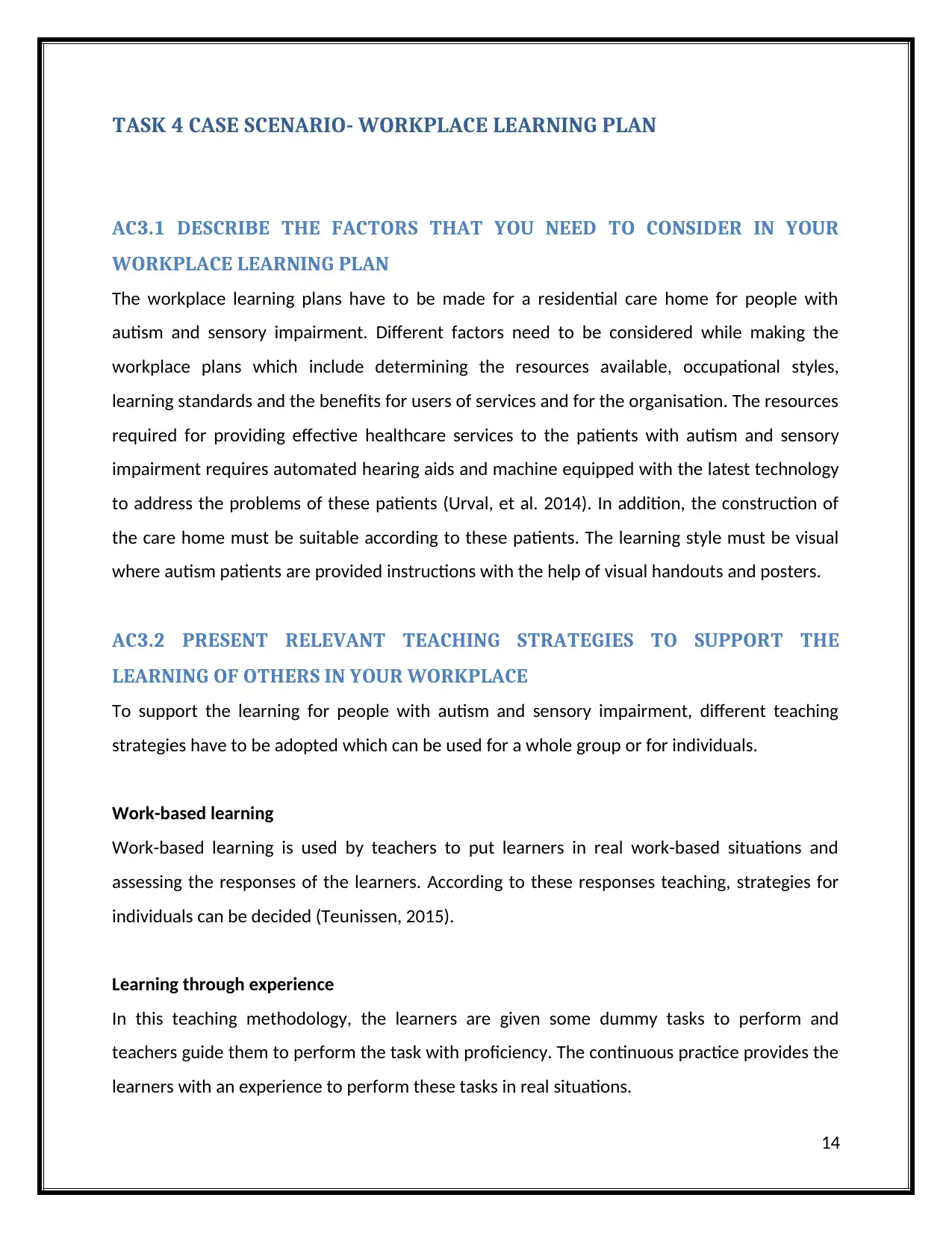
TASK 4 CASE SCENARIO- WORKPLACE LEARNING PLAN
AC3.1 DESCRIBE THE FACTORS THAT YOU NEED TO CONSIDER IN YOUR
WORKPLACE LEARNING PLAN
The workplace learning plans have to be made for a residential care home for people with
autism and sensory impairment. Different factors need to be considered while making the
workplace plans which include determining the resources available, occupational styles,
learning standards and the benefits for users of services and for the organisation. The resources
required for providing effective healthcare services to the patients with autism and sensory
impairment requires automated hearing aids and machine equipped with the latest technology
to address the problems of these patients (Urval, et al. 2014). In addition, the construction of
the care home must be suitable according to these patients. The learning style must be visual
where autism patients are provided instructions with the help of visual handouts and posters.
AC3.2 PRESENT RELEVANT TEACHING STRATEGIES TO SUPPORT THE
LEARNING OF OTHERS IN YOUR WORKPLACE
To support the learning for people with autism and sensory impairment, different teaching
strategies have to be adopted which can be used for a whole group or for individuals.
Work-based learning
Work-based learning is used by teachers to put learners in real work-based situations and
assessing the responses of the learners. According to these responses teaching, strategies for
individuals can be decided (Teunissen, 2015).
Learning through experience
In this teaching methodology, the learners are given some dummy tasks to perform and
teachers guide them to perform the task with proficiency. The continuous practice provides the
learners with an experience to perform these tasks in real situations.
14
AC3.1 DESCRIBE THE FACTORS THAT YOU NEED TO CONSIDER IN YOUR
WORKPLACE LEARNING PLAN
The workplace learning plans have to be made for a residential care home for people with
autism and sensory impairment. Different factors need to be considered while making the
workplace plans which include determining the resources available, occupational styles,
learning standards and the benefits for users of services and for the organisation. The resources
required for providing effective healthcare services to the patients with autism and sensory
impairment requires automated hearing aids and machine equipped with the latest technology
to address the problems of these patients (Urval, et al. 2014). In addition, the construction of
the care home must be suitable according to these patients. The learning style must be visual
where autism patients are provided instructions with the help of visual handouts and posters.
AC3.2 PRESENT RELEVANT TEACHING STRATEGIES TO SUPPORT THE
LEARNING OF OTHERS IN YOUR WORKPLACE
To support the learning for people with autism and sensory impairment, different teaching
strategies have to be adopted which can be used for a whole group or for individuals.
Work-based learning
Work-based learning is used by teachers to put learners in real work-based situations and
assessing the responses of the learners. According to these responses teaching, strategies for
individuals can be decided (Teunissen, 2015).
Learning through experience
In this teaching methodology, the learners are given some dummy tasks to perform and
teachers guide them to perform the task with proficiency. The continuous practice provides the
learners with an experience to perform these tasks in real situations.
14
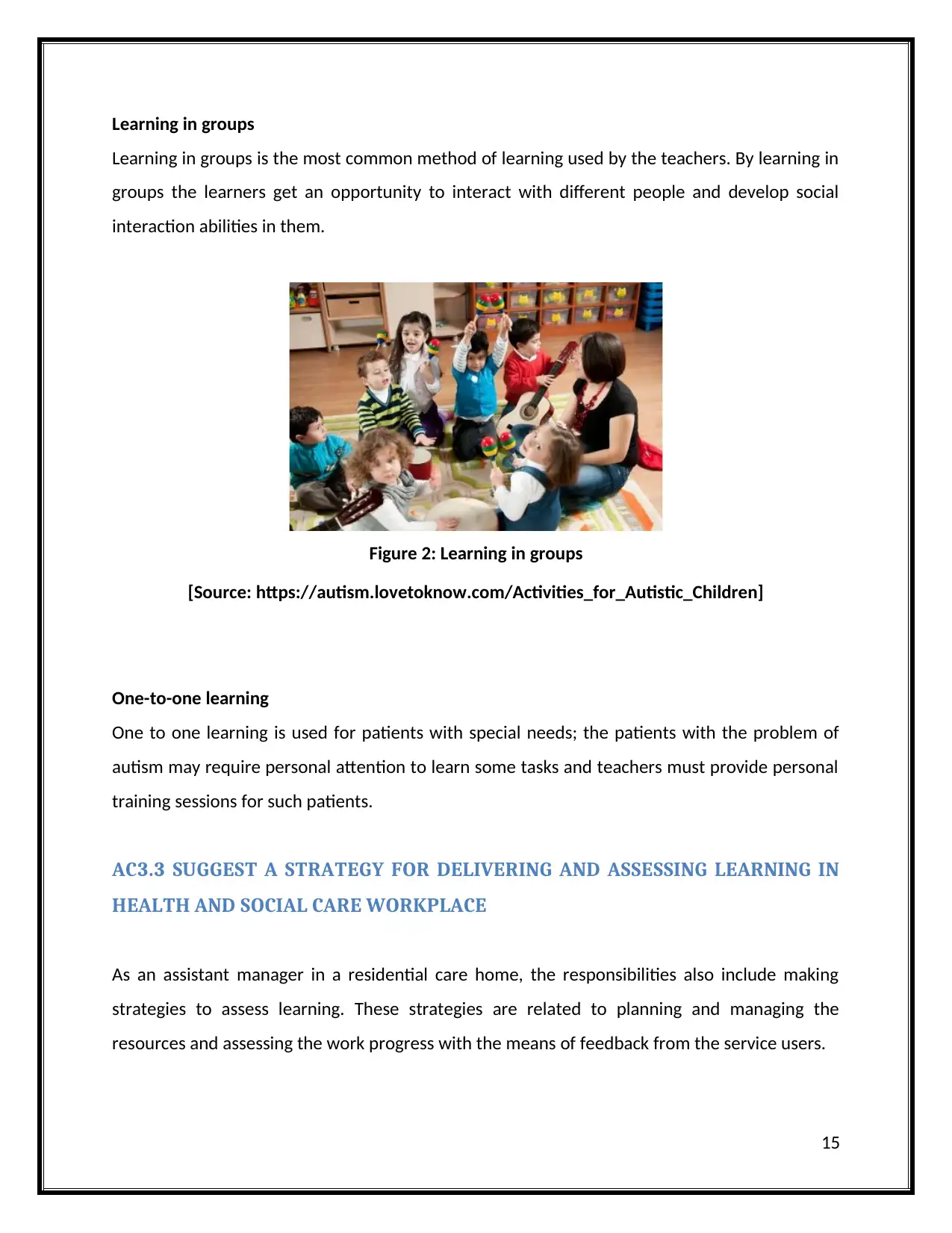
Learning in groups
Learning in groups is the most common method of learning used by the teachers. By learning in
groups the learners get an opportunity to interact with different people and develop social
interaction abilities in them.
Figure 2: Learning in groups
[Source: https://autism.lovetoknow.com/Activities_for_Autistic_Children]
One-to-one learning
One to one learning is used for patients with special needs; the patients with the problem of
autism may require personal attention to learn some tasks and teachers must provide personal
training sessions for such patients.
AC3.3 SUGGEST A STRATEGY FOR DELIVERING AND ASSESSING LEARNING IN
HEALTH AND SOCIAL CARE WORKPLACE
As an assistant manager in a residential care home, the responsibilities also include making
strategies to assess learning. These strategies are related to planning and managing the
resources and assessing the work progress with the means of feedback from the service users.
15
Learning in groups is the most common method of learning used by the teachers. By learning in
groups the learners get an opportunity to interact with different people and develop social
interaction abilities in them.
Figure 2: Learning in groups
[Source: https://autism.lovetoknow.com/Activities_for_Autistic_Children]
One-to-one learning
One to one learning is used for patients with special needs; the patients with the problem of
autism may require personal attention to learn some tasks and teachers must provide personal
training sessions for such patients.
AC3.3 SUGGEST A STRATEGY FOR DELIVERING AND ASSESSING LEARNING IN
HEALTH AND SOCIAL CARE WORKPLACE
As an assistant manager in a residential care home, the responsibilities also include making
strategies to assess learning. These strategies are related to planning and managing the
resources and assessing the work progress with the means of feedback from the service users.
15
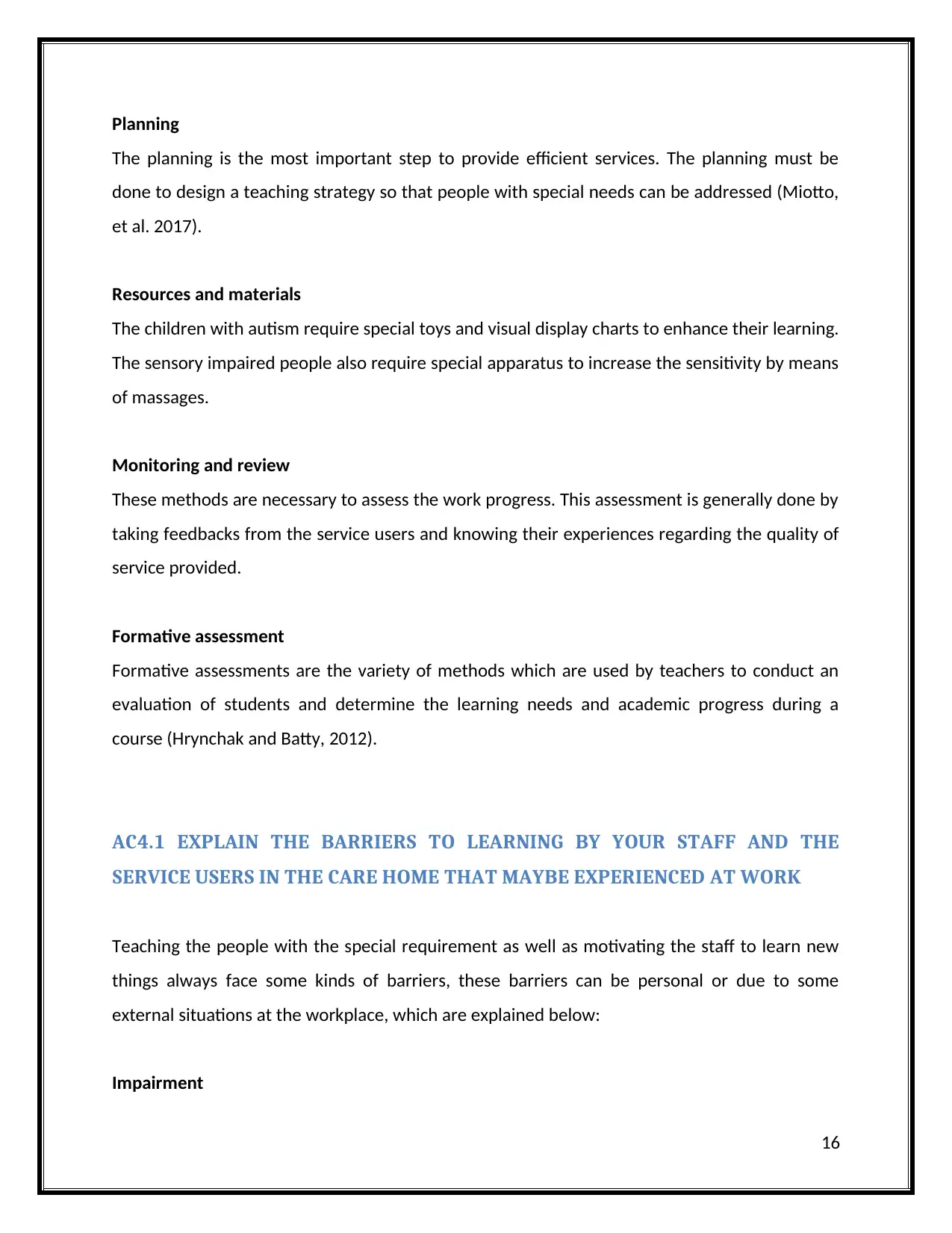
Planning
The planning is the most important step to provide efficient services. The planning must be
done to design a teaching strategy so that people with special needs can be addressed (Miotto,
et al. 2017).
Resources and materials
The children with autism require special toys and visual display charts to enhance their learning.
The sensory impaired people also require special apparatus to increase the sensitivity by means
of massages.
Monitoring and review
These methods are necessary to assess the work progress. This assessment is generally done by
taking feedbacks from the service users and knowing their experiences regarding the quality of
service provided.
Formative assessment
Formative assessments are the variety of methods which are used by teachers to conduct an
evaluation of students and determine the learning needs and academic progress during a
course (Hrynchak and Batty, 2012).
AC4.1 EXPLAIN THE BARRIERS TO LEARNING BY YOUR STAFF AND THE
SERVICE USERS IN THE CARE HOME THAT MAYBE EXPERIENCED AT WORK
Teaching the people with the special requirement as well as motivating the staff to learn new
things always face some kinds of barriers, these barriers can be personal or due to some
external situations at the workplace, which are explained below:
Impairment
16
The planning is the most important step to provide efficient services. The planning must be
done to design a teaching strategy so that people with special needs can be addressed (Miotto,
et al. 2017).
Resources and materials
The children with autism require special toys and visual display charts to enhance their learning.
The sensory impaired people also require special apparatus to increase the sensitivity by means
of massages.
Monitoring and review
These methods are necessary to assess the work progress. This assessment is generally done by
taking feedbacks from the service users and knowing their experiences regarding the quality of
service provided.
Formative assessment
Formative assessments are the variety of methods which are used by teachers to conduct an
evaluation of students and determine the learning needs and academic progress during a
course (Hrynchak and Batty, 2012).
AC4.1 EXPLAIN THE BARRIERS TO LEARNING BY YOUR STAFF AND THE
SERVICE USERS IN THE CARE HOME THAT MAYBE EXPERIENCED AT WORK
Teaching the people with the special requirement as well as motivating the staff to learn new
things always face some kinds of barriers, these barriers can be personal or due to some
external situations at the workplace, which are explained below:
Impairment
16
Secure Best Marks with AI Grader
Need help grading? Try our AI Grader for instant feedback on your assignments.
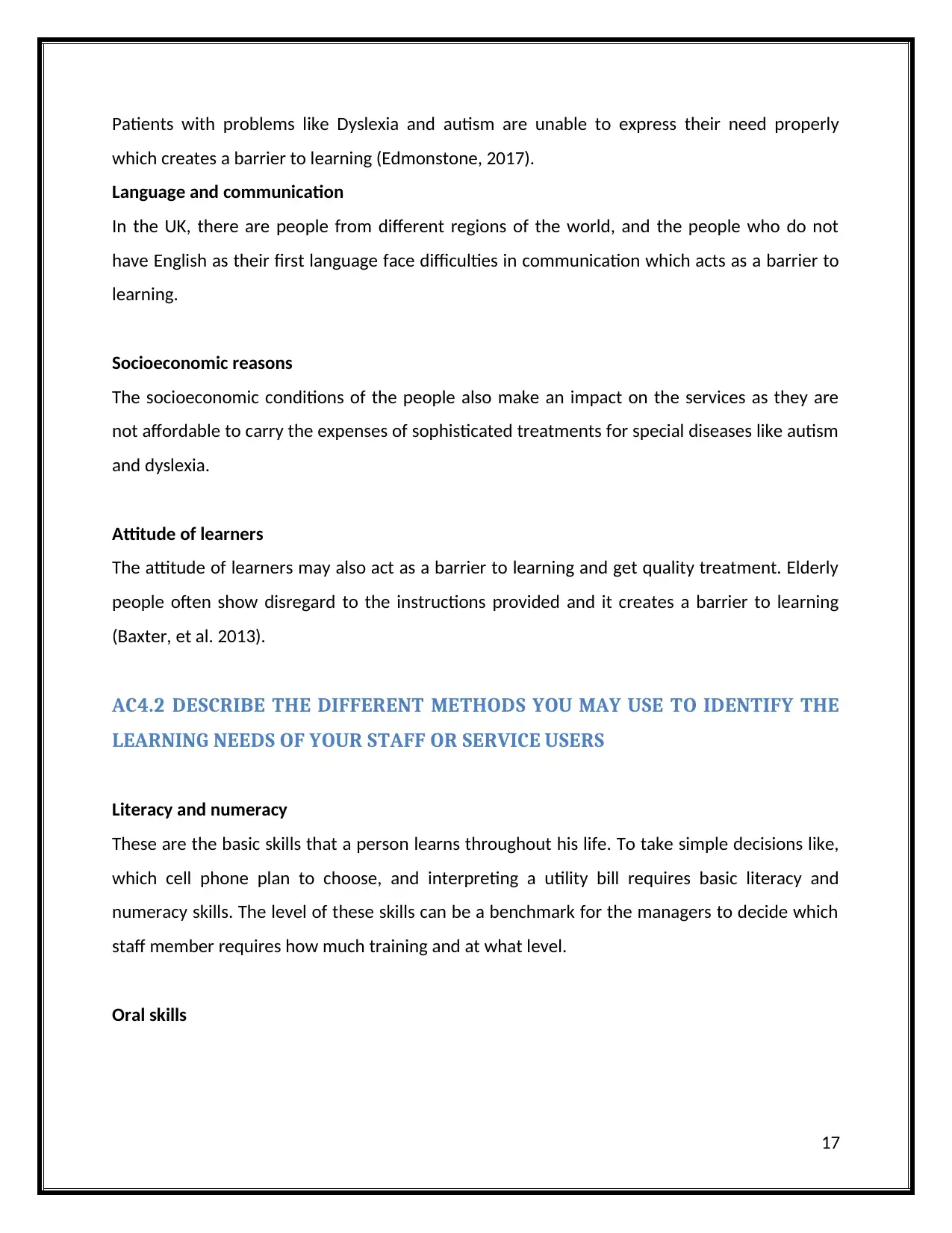
Patients with problems like Dyslexia and autism are unable to express their need properly
which creates a barrier to learning (Edmonstone, 2017).
Language and communication
In the UK, there are people from different regions of the world, and the people who do not
have English as their first language face difficulties in communication which acts as a barrier to
learning.
Socioeconomic reasons
The socioeconomic conditions of the people also make an impact on the services as they are
not affordable to carry the expenses of sophisticated treatments for special diseases like autism
and dyslexia.
Attitude of learners
The attitude of learners may also act as a barrier to learning and get quality treatment. Elderly
people often show disregard to the instructions provided and it creates a barrier to learning
(Baxter, et al. 2013).
AC4.2 DESCRIBE THE DIFFERENT METHODS YOU MAY USE TO IDENTIFY THE
LEARNING NEEDS OF YOUR STAFF OR SERVICE USERS
Literacy and numeracy
These are the basic skills that a person learns throughout his life. To take simple decisions like,
which cell phone plan to choose, and interpreting a utility bill requires basic literacy and
numeracy skills. The level of these skills can be a benchmark for the managers to decide which
staff member requires how much training and at what level.
Oral skills
17
which creates a barrier to learning (Edmonstone, 2017).
Language and communication
In the UK, there are people from different regions of the world, and the people who do not
have English as their first language face difficulties in communication which acts as a barrier to
learning.
Socioeconomic reasons
The socioeconomic conditions of the people also make an impact on the services as they are
not affordable to carry the expenses of sophisticated treatments for special diseases like autism
and dyslexia.
Attitude of learners
The attitude of learners may also act as a barrier to learning and get quality treatment. Elderly
people often show disregard to the instructions provided and it creates a barrier to learning
(Baxter, et al. 2013).
AC4.2 DESCRIBE THE DIFFERENT METHODS YOU MAY USE TO IDENTIFY THE
LEARNING NEEDS OF YOUR STAFF OR SERVICE USERS
Literacy and numeracy
These are the basic skills that a person learns throughout his life. To take simple decisions like,
which cell phone plan to choose, and interpreting a utility bill requires basic literacy and
numeracy skills. The level of these skills can be a benchmark for the managers to decide which
staff member requires how much training and at what level.
Oral skills
17
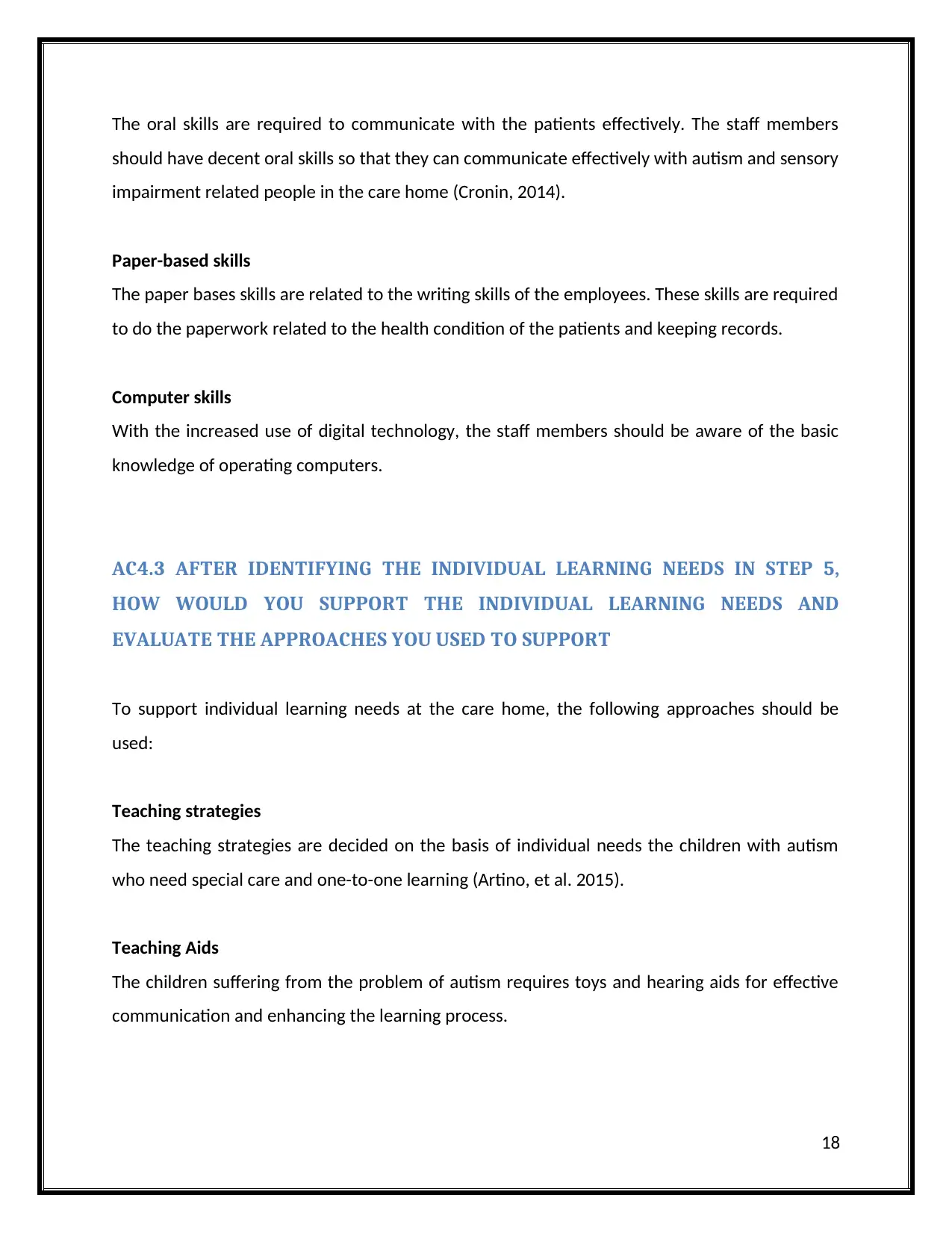
The oral skills are required to communicate with the patients effectively. The staff members
should have decent oral skills so that they can communicate effectively with autism and sensory
impairment related people in the care home (Cronin, 2014).
Paper-based skills
The paper bases skills are related to the writing skills of the employees. These skills are required
to do the paperwork related to the health condition of the patients and keeping records.
Computer skills
With the increased use of digital technology, the staff members should be aware of the basic
knowledge of operating computers.
AC4.3 AFTER IDENTIFYING THE INDIVIDUAL LEARNING NEEDS IN STEP 5,
HOW WOULD YOU SUPPORT THE INDIVIDUAL LEARNING NEEDS AND
EVALUATE THE APPROACHES YOU USED TO SUPPORT
To support individual learning needs at the care home, the following approaches should be
used:
Teaching strategies
The teaching strategies are decided on the basis of individual needs the children with autism
who need special care and one-to-one learning (Artino, et al. 2015).
Teaching Aids
The children suffering from the problem of autism requires toys and hearing aids for effective
communication and enhancing the learning process.
18
should have decent oral skills so that they can communicate effectively with autism and sensory
impairment related people in the care home (Cronin, 2014).
Paper-based skills
The paper bases skills are related to the writing skills of the employees. These skills are required
to do the paperwork related to the health condition of the patients and keeping records.
Computer skills
With the increased use of digital technology, the staff members should be aware of the basic
knowledge of operating computers.
AC4.3 AFTER IDENTIFYING THE INDIVIDUAL LEARNING NEEDS IN STEP 5,
HOW WOULD YOU SUPPORT THE INDIVIDUAL LEARNING NEEDS AND
EVALUATE THE APPROACHES YOU USED TO SUPPORT
To support individual learning needs at the care home, the following approaches should be
used:
Teaching strategies
The teaching strategies are decided on the basis of individual needs the children with autism
who need special care and one-to-one learning (Artino, et al. 2015).
Teaching Aids
The children suffering from the problem of autism requires toys and hearing aids for effective
communication and enhancing the learning process.
18
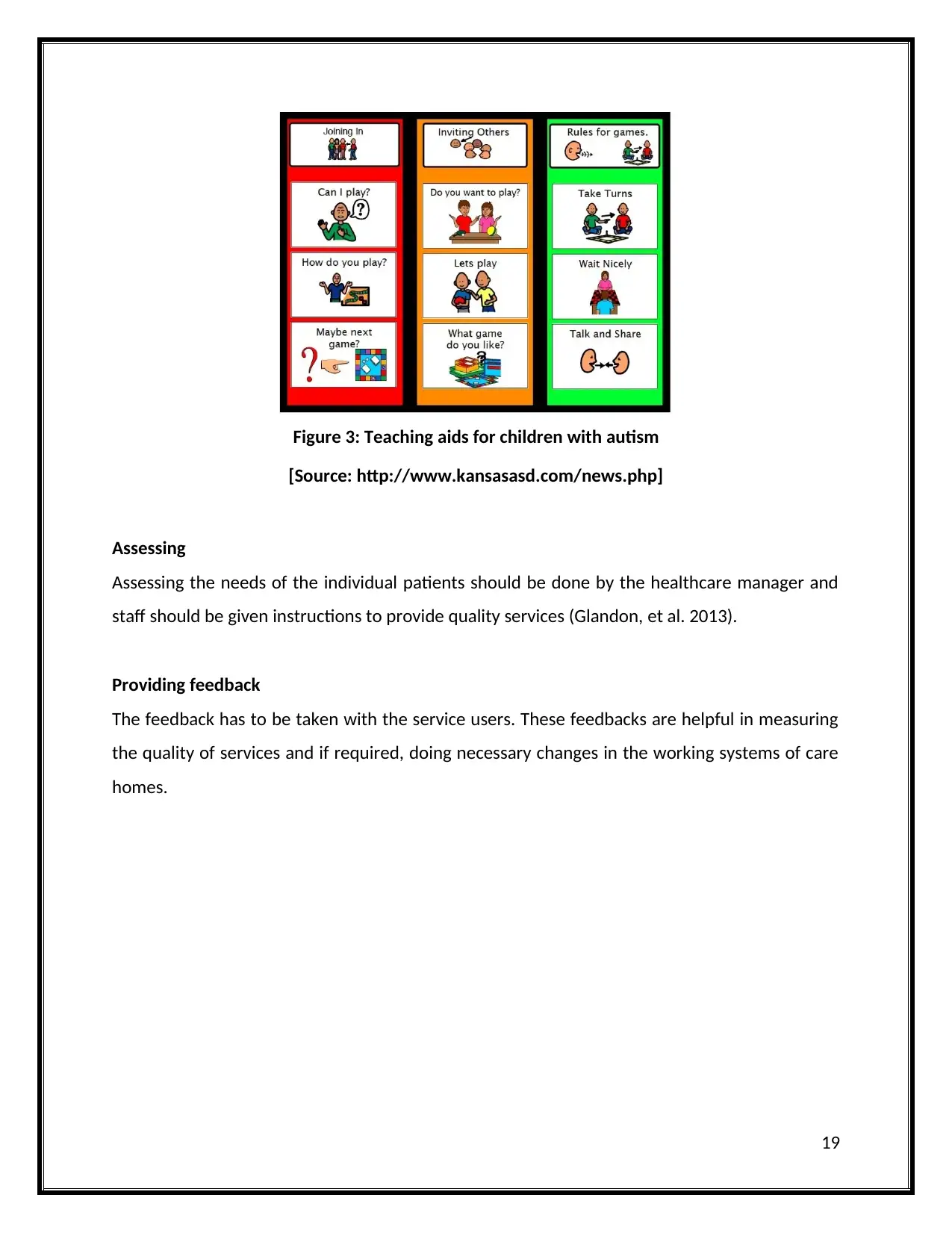
Figure 3: Teaching aids for children with autism
[Source: http://www.kansasasd.com/news.php]
Assessing
Assessing the needs of the individual patients should be done by the healthcare manager and
staff should be given instructions to provide quality services (Glandon, et al. 2013).
Providing feedback
The feedback has to be taken with the service users. These feedbacks are helpful in measuring
the quality of services and if required, doing necessary changes in the working systems of care
homes.
19
[Source: http://www.kansasasd.com/news.php]
Assessing
Assessing the needs of the individual patients should be done by the healthcare manager and
staff should be given instructions to provide quality services (Glandon, et al. 2013).
Providing feedback
The feedback has to be taken with the service users. These feedbacks are helpful in measuring
the quality of services and if required, doing necessary changes in the working systems of care
homes.
19
Paraphrase This Document
Need a fresh take? Get an instant paraphrase of this document with our AI Paraphraser
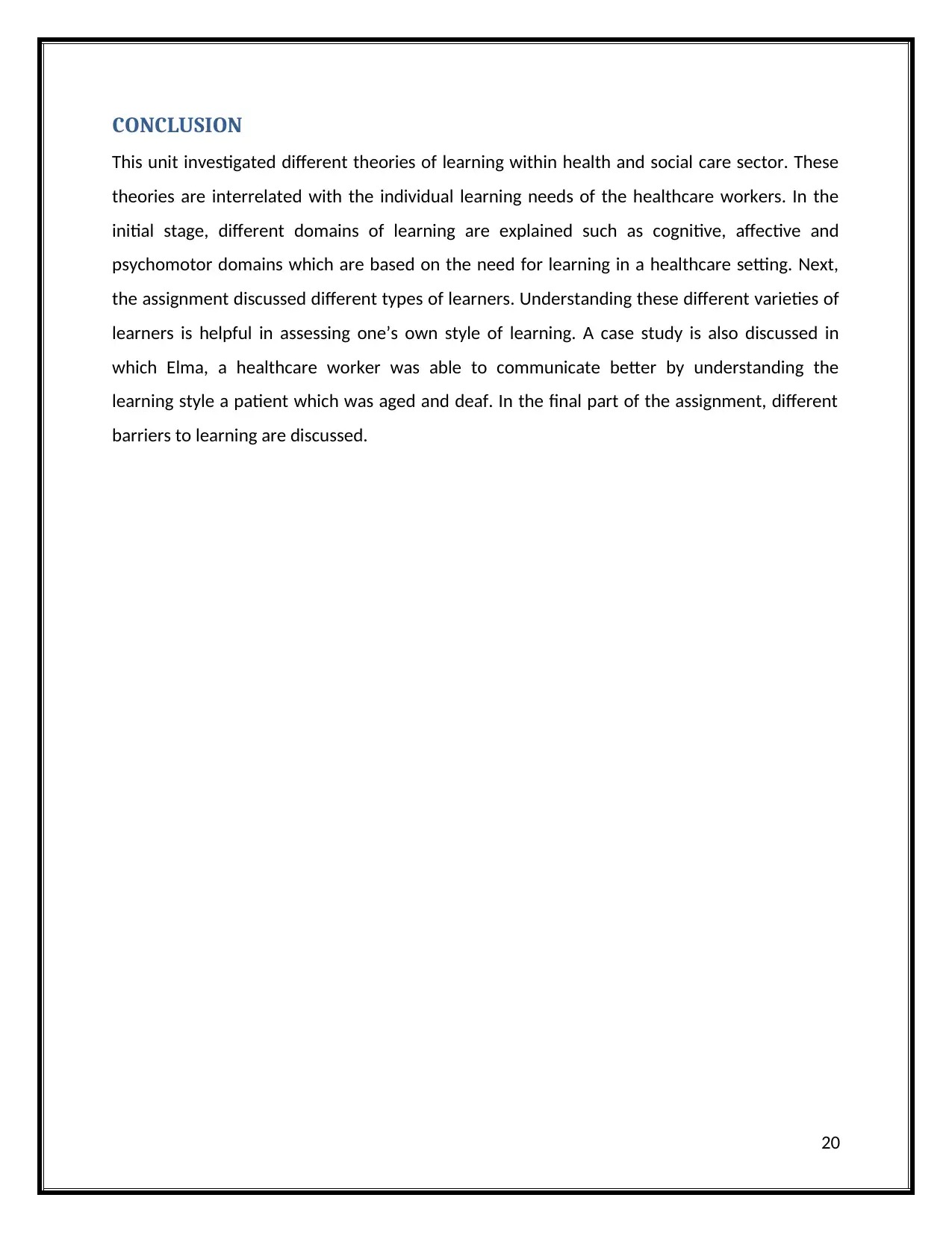
CONCLUSION
This unit investigated different theories of learning within health and social care sector. These
theories are interrelated with the individual learning needs of the healthcare workers. In the
initial stage, different domains of learning are explained such as cognitive, affective and
psychomotor domains which are based on the need for learning in a healthcare setting. Next,
the assignment discussed different types of learners. Understanding these different varieties of
learners is helpful in assessing one’s own style of learning. A case study is also discussed in
which Elma, a healthcare worker was able to communicate better by understanding the
learning style a patient which was aged and deaf. In the final part of the assignment, different
barriers to learning are discussed.
20
This unit investigated different theories of learning within health and social care sector. These
theories are interrelated with the individual learning needs of the healthcare workers. In the
initial stage, different domains of learning are explained such as cognitive, affective and
psychomotor domains which are based on the need for learning in a healthcare setting. Next,
the assignment discussed different types of learners. Understanding these different varieties of
learners is helpful in assessing one’s own style of learning. A case study is also discussed in
which Elma, a healthcare worker was able to communicate better by understanding the
learning style a patient which was aged and deaf. In the final part of the assignment, different
barriers to learning are discussed.
20
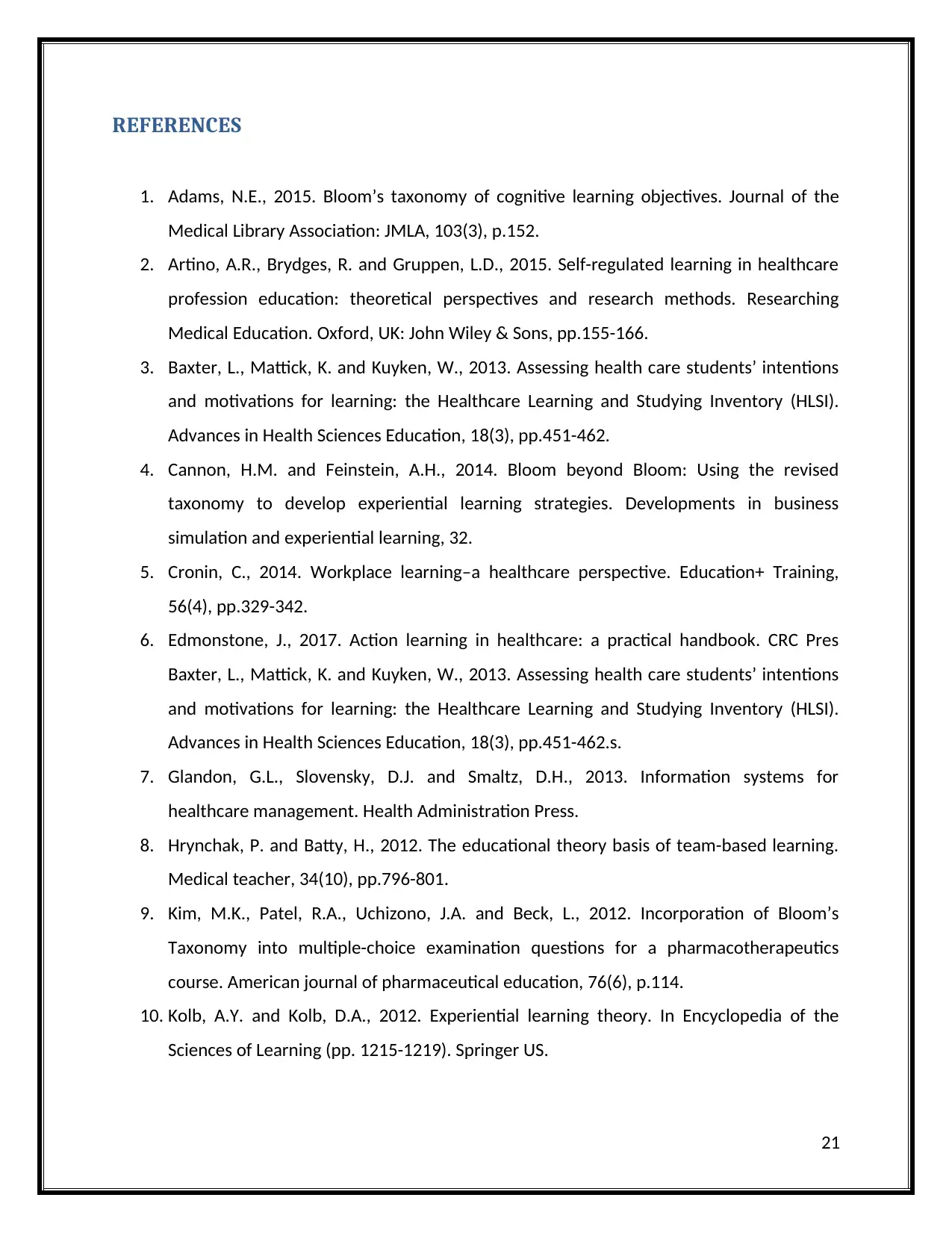
REFERENCES
1. Adams, N.E., 2015. Bloom’s taxonomy of cognitive learning objectives. Journal of the
Medical Library Association: JMLA, 103(3), p.152.
2. Artino, A.R., Brydges, R. and Gruppen, L.D., 2015. Self-regulated learning in healthcare
profession education: theoretical perspectives and research methods. Researching
Medical Education. Oxford, UK: John Wiley & Sons, pp.155-166.
3. Baxter, L., Mattick, K. and Kuyken, W., 2013. Assessing health care students’ intentions
and motivations for learning: the Healthcare Learning and Studying Inventory (HLSI).
Advances in Health Sciences Education, 18(3), pp.451-462.
4. Cannon, H.M. and Feinstein, A.H., 2014. Bloom beyond Bloom: Using the revised
taxonomy to develop experiential learning strategies. Developments in business
simulation and experiential learning, 32.
5. Cronin, C., 2014. Workplace learning–a healthcare perspective. Education+ Training,
56(4), pp.329-342.
6. Edmonstone, J., 2017. Action learning in healthcare: a practical handbook. CRC Pres
Baxter, L., Mattick, K. and Kuyken, W., 2013. Assessing health care students’ intentions
and motivations for learning: the Healthcare Learning and Studying Inventory (HLSI).
Advances in Health Sciences Education, 18(3), pp.451-462.s.
7. Glandon, G.L., Slovensky, D.J. and Smaltz, D.H., 2013. Information systems for
healthcare management. Health Administration Press.
8. Hrynchak, P. and Batty, H., 2012. The educational theory basis of team-based learning.
Medical teacher, 34(10), pp.796-801.
9. Kim, M.K., Patel, R.A., Uchizono, J.A. and Beck, L., 2012. Incorporation of Bloom’s
Taxonomy into multiple-choice examination questions for a pharmacotherapeutics
course. American journal of pharmaceutical education, 76(6), p.114.
10. Kolb, A.Y. and Kolb, D.A., 2012. Experiential learning theory. In Encyclopedia of the
Sciences of Learning (pp. 1215-1219). Springer US.
21
1. Adams, N.E., 2015. Bloom’s taxonomy of cognitive learning objectives. Journal of the
Medical Library Association: JMLA, 103(3), p.152.
2. Artino, A.R., Brydges, R. and Gruppen, L.D., 2015. Self-regulated learning in healthcare
profession education: theoretical perspectives and research methods. Researching
Medical Education. Oxford, UK: John Wiley & Sons, pp.155-166.
3. Baxter, L., Mattick, K. and Kuyken, W., 2013. Assessing health care students’ intentions
and motivations for learning: the Healthcare Learning and Studying Inventory (HLSI).
Advances in Health Sciences Education, 18(3), pp.451-462.
4. Cannon, H.M. and Feinstein, A.H., 2014. Bloom beyond Bloom: Using the revised
taxonomy to develop experiential learning strategies. Developments in business
simulation and experiential learning, 32.
5. Cronin, C., 2014. Workplace learning–a healthcare perspective. Education+ Training,
56(4), pp.329-342.
6. Edmonstone, J., 2017. Action learning in healthcare: a practical handbook. CRC Pres
Baxter, L., Mattick, K. and Kuyken, W., 2013. Assessing health care students’ intentions
and motivations for learning: the Healthcare Learning and Studying Inventory (HLSI).
Advances in Health Sciences Education, 18(3), pp.451-462.s.
7. Glandon, G.L., Slovensky, D.J. and Smaltz, D.H., 2013. Information systems for
healthcare management. Health Administration Press.
8. Hrynchak, P. and Batty, H., 2012. The educational theory basis of team-based learning.
Medical teacher, 34(10), pp.796-801.
9. Kim, M.K., Patel, R.A., Uchizono, J.A. and Beck, L., 2012. Incorporation of Bloom’s
Taxonomy into multiple-choice examination questions for a pharmacotherapeutics
course. American journal of pharmaceutical education, 76(6), p.114.
10. Kolb, A.Y. and Kolb, D.A., 2012. Experiential learning theory. In Encyclopedia of the
Sciences of Learning (pp. 1215-1219). Springer US.
21
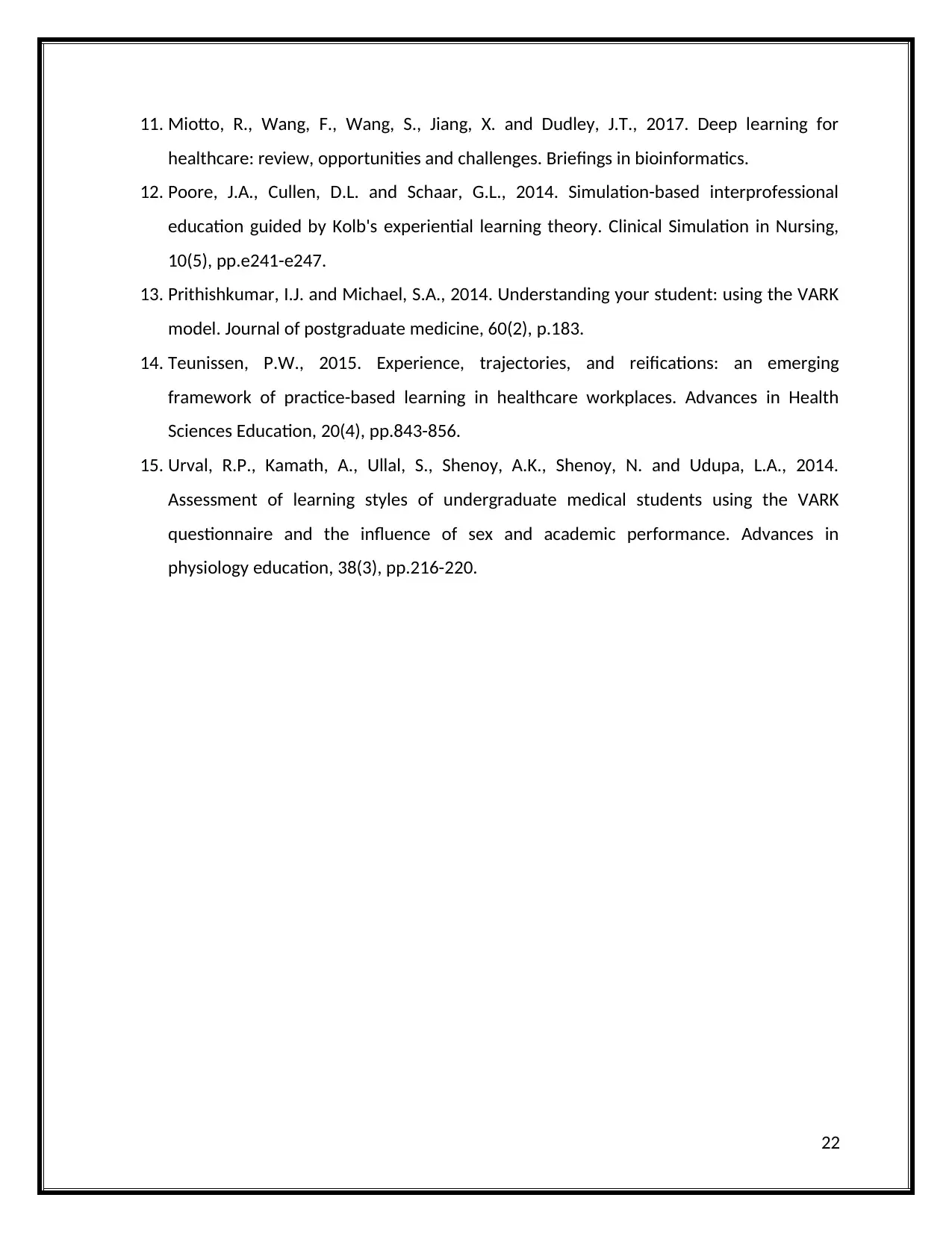
11. Miotto, R., Wang, F., Wang, S., Jiang, X. and Dudley, J.T., 2017. Deep learning for
healthcare: review, opportunities and challenges. Briefings in bioinformatics.
12. Poore, J.A., Cullen, D.L. and Schaar, G.L., 2014. Simulation-based interprofessional
education guided by Kolb's experiential learning theory. Clinical Simulation in Nursing,
10(5), pp.e241-e247.
13. Prithishkumar, I.J. and Michael, S.A., 2014. Understanding your student: using the VARK
model. Journal of postgraduate medicine, 60(2), p.183.
14. Teunissen, P.W., 2015. Experience, trajectories, and reifications: an emerging
framework of practice-based learning in healthcare workplaces. Advances in Health
Sciences Education, 20(4), pp.843-856.
15. Urval, R.P., Kamath, A., Ullal, S., Shenoy, A.K., Shenoy, N. and Udupa, L.A., 2014.
Assessment of learning styles of undergraduate medical students using the VARK
questionnaire and the influence of sex and academic performance. Advances in
physiology education, 38(3), pp.216-220.
22
healthcare: review, opportunities and challenges. Briefings in bioinformatics.
12. Poore, J.A., Cullen, D.L. and Schaar, G.L., 2014. Simulation-based interprofessional
education guided by Kolb's experiential learning theory. Clinical Simulation in Nursing,
10(5), pp.e241-e247.
13. Prithishkumar, I.J. and Michael, S.A., 2014. Understanding your student: using the VARK
model. Journal of postgraduate medicine, 60(2), p.183.
14. Teunissen, P.W., 2015. Experience, trajectories, and reifications: an emerging
framework of practice-based learning in healthcare workplaces. Advances in Health
Sciences Education, 20(4), pp.843-856.
15. Urval, R.P., Kamath, A., Ullal, S., Shenoy, A.K., Shenoy, N. and Udupa, L.A., 2014.
Assessment of learning styles of undergraduate medical students using the VARK
questionnaire and the influence of sex and academic performance. Advances in
physiology education, 38(3), pp.216-220.
22
1 out of 22
Related Documents
Your All-in-One AI-Powered Toolkit for Academic Success.
+13062052269
info@desklib.com
Available 24*7 on WhatsApp / Email
![[object Object]](/_next/static/media/star-bottom.7253800d.svg)
Unlock your academic potential
© 2024 | Zucol Services PVT LTD | All rights reserved.





